Text
Reflections on Ancient Astronauts in Prometheus
Ridley Scott's highly anticipated Alien prequel Prometheus promised to answer the questions Alien fans had been asking about the origins of the famous Xenomorphs since the release of Alien in 1979. Unfortunately, cinema goers will have to wait for the sequel as the film asks more questions than it answers. Audiences might have gotten some tentative answers about the evolution of the Alien, but they were left wondering about mankind's own origin. We can, however, look to other films that have explored the ancient astronaut theory to find some possible answers.
In a viral video released to promote Scott's return to the universe of space jockeys and chest-bursters, a young Peter Wayland, the founder and CEO of Weyland Corp, gives a presentation at the TED conference in the year 2023. During his talk the corporate chief lists mankind's greatest discoveries and inventions, culminating with the creation of "cybernetic individuals" who we're told in just a few short years will be indistinguishable from us. "We are the Gods now", Weyland boasts at the end.
The TED 2023 video sets up audiences for the events of Prometheus, in which in 2090 a human crew are sent to LV-223 to investigate the theory that humans were created by an unknown extraterrestrial species thousands of years ago.
Oddly paralleling the UFO research, after the opening credits two archaeologists discover a cave painting in Scotland of a star map that resembles the one drawn in real life by Betty Hill after recalling her alien abduction experience from 1961. This might just be a coincidence, however, Marjorie Fish has interrupted the Betty Hill star map as showing the double star system of Zeta Reticuli, which is the same star system where the Prometheus crew journey to in search of mankind's creators. Although, the name of the solar system is never stated in Prometheus, it is mentioned by the character Lambert in the original Alien.
The biggest problem with Prometheus is that the purpose the alien "engineers" had for creating humans is never revealed, although we are told they intended to wipe out all life on Earth before they either changed their minds or were interrupted at the last minuet. The closest we get to an answer as to why the "Gods" created mankind is when Mr Weyland's android son David asks one of the crewmen why did humans create artificial humans like himself. The answer "because we could" is as disappointing as it is scary.
The ancient astronaut theory, of course, is nothing new, especially in science fiction. Before Eric Von Daniken's 1968 best-seller Chariots of the Gods? popularised the theory that Earth had been visited by extraterrestrials back in pre-history, science fiction writers like Arthur C. Clarke and Nigel Kneale were exploring this idea in fiction.
In 2001: A Space Odyssey, the film begins with a tribe of apemen being visited by a mysterious black monolith. After touching the alien object the apeman tribe begins to develop new skills and intelligence. This is shown by the apeman leader Moon-Watcher picking up a bone and using it as a club. In a documentary about the making of 2001 to mark the film's 30th anniversary, Arthur C. Clarke explained that he and the director Stanley Kubrick had intended the strange artifact to be a kind of teaching machine: "The Monolith was essentially a teaching machine. In fact our original idea was to have something with a transparent screen on which images would appear, which would teach the apes how to fight each other, how to maybe even make fire. But that was much too naive an idea. So eventually we just bypassed it with a device which we didn't explain ... but they just touched it, and things happened to their brains, and they were transformed."
Clarke also explains in the same documentary the meaning of the famous scene when Moon-Watcher throws the bone weapon he invents into the air and the scene shifts to a satellite orbiting Earth in the year 2001. According to the inventor of the communications satellite, the spacecraft orbiting Earth is a nuclear weapon. The message being that the same intelligence that gave humans the ability to go into space can also be used to destroy ourselves before we journey into outer space.
Apemen were also the target of ancient alien manipulation in Nigel Kneale's third Quatermass story, Quatermass and The Pit. Originally a six part story broadcast live on the BBC between December 1959 and January 1958, the story centres around the discovery of a mysterious "unexploded bomb" at an archaeological dig in London. Found near the remains of apemen with unusually large skulls, the object is in fact a Martian spaceship that had been sent to Earth to return several apemen to the planet after they had been augmented. Going one step beyond 2001, the reason the aliens had for altering the apemen is given in Quatermass and The Pit. With their own race doomed by an environmental cataclysm on Mars, the aliens intended the apemen to be their successors. In the words of Quatermass: "It would be a way of possessing the Earth. Only a colony by proxy, but better than leaving nothing at all behind."
Another interesting parallel between Clarke's 2001 and Nigel Kneale's Quatermass and The Pit is that that the increased intelligence of the apemen has potentially catastrophic results. In 2001 the very first tool Moon-Watcher creates is used as a weapon to club another apeman to death, and millions of years later mankind uses its intelligence to put nuclear weapons in orbit. Paralleling this, Quatermass and The Pit begins with Professor Quatermass condemning a government plan to put similar weapons in space. Might this have been the reason for the "engineers" in Prometheus wanting to wipe us out, were they afraid of what humans might do once they began to develop more sophisticated weapons than bone clubs? In Ufology the explosion of the first atomic bomb in 1945 is often suggested as a reason why aliens might be visiting Earth, but if Scott's "engineers" had similar concerns about the course human technology was taking towards destruction, then why then didn't they go ahead with their planned annihilation of all life on Earth?
Again a possible explanation might be found in Kneale's Quatemass and The Pit. In that film the reason the aliens are unable to finish their colonisation of Earth is because the Martians, obsessed with a hatred for nonconformity and anything different, wipe themselves out in a race war first.
Prometheus ends with the archaeologist Elizabeth Shaw and the decapitated head of the android David setting course for the home world of the "engineers". Will they find a dead planet with only hints of the civilisation that once existed there in the proposed sequel to the prequel? We will have to wait for Scott to finish his long awaited Blade Runner sequel, another film that asks questions about the nature of God, to find out.
Whether any of these films are some form of UFO disclosure or disinformation effort, or simply the product of imaginative minds... I'll leave that for another column, though.

READ RICHARD THOMAS'S SCI-FI WORLDS COLUMN FOR BINNALL OF AMERICA
0 notes
Text
A Sci-Fi Worlds Interview with Lance Parkin

Richard Thomas: Just want to start by saying thanks for giving me and the Sci-Fi Worlds readers the time to answer these questions. It's really appreciated, so thanks.
I first became a fan of Doctor Who after my dad bought me the VHS video release of Genesis of the Daleks when I was about five or six I think. After that I started watching the Doctor Who repeats on UK Gold. How did you first become a fan of the series and did you have a particular favourite adversary and/or story growing up?
Lance Parkin: I've been a fan longer than I remember. I vaguely remember the pterodactyl in Invasion of the Dinosaurs. The first story I've got vivid memories of is Pyramids of Mars. I've always been startlingly uncritical about Doctor Who. I love it all. 'My' Doctor Who is Tom, Lalla and K9, my favourite era is the Rebecca Levene Golden Age of the New Adventures, I adore the new series.
Richard Thomas: With the advent of blogs it's probably easier than ever for someone to begin writing. How did you start your writing career and how has it evolved over the years?
Lance Parkin: Virgin took new writers for their Doctor Who range, so I had a go and it worked. It's as simple as that. I wrote a couple of sample chapters for a Doctor Who novel called Just War and sent them in and I got commissioned and the book got published. Then they wanted a follow-up, then another, then another, then another, then Gareth Roberts invited me to become a storyline writer on Emmerdale and, three years after my first book, at the age of 27, I was a full-time writer. I sort of knew I was lucky, but I didn't really understand it at the time.
After Emmerdale, I tried out for a couple of TV shows, but my heart wasn't in it. It's impossible, I think, for a British television viewer of good conscience to sit in the place they make Holby City without having Operation Valkyrie fantasies. So I reached a plateau with my writing a few years ago. I made a (fairly modest) living from being a writer, and that's pretty good going, but I was being hired by the same people who'd always hired me. Don't get me wrong: I'm extremely grateful to all the opportunities all those people have offered. About half the stuff I've done is Doctor Who related. I love Doctor Who, adore it, and the new series opened up new challenges, but I was aware I needed to step things up a little.
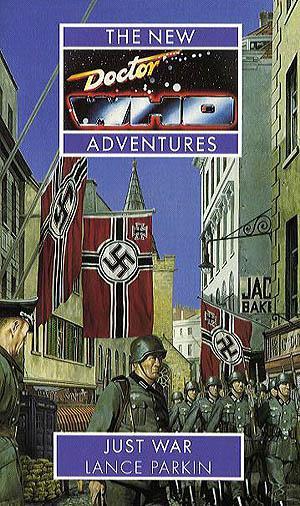
Last year, I finally sat down and decided to write an original novel and try to get an agent. I'd tried this a couple of times before, but nothing ever worked out. This time, I started on a book, an historical novel, that just wasn't clicking. So I started a short story called Fixing Jesus, a completely different thing, wrote that in a day or two and realised I'd written the first chapter of a novel.
After that, things happened surreally fast. I wrote to a few agents, sending them the first few chapters of Fixing Jesus and most of them were very keen. For some reason, I'd done something that just clicked. One agent in particular, though, really understood the book, better than I did. That was Jessica Papin at Dystel and Goderich. I reworked the book pretty much from top to bottom (apart from that first chapter, which is just about word-for-word the way it was as a short story) and she agreed to represent me.
So I'm up off my plateau. I have Fixing Jesus doing the rounds, and hopefully that'll be picked up by someone, I'm also just about to sign a really exciting, really big non-fiction deal I can't talk about yet. After that, I think it'll probably be back to the historical novel.
In terms of blogs and being published … it's easier than ever to be published. It's harder than ever, I think, to be paid to write. The price of printing and distribution is so much lower than it used to be, and small presses can sell books over the internet. But that's always going to be to a limited audience. The major publishers are also making savings where they can, and that's often by not being as generous to writers, either upfront or for things like ebook rights.
I don't believe in the death of print or that people are going to stop reading books. I do think that publishers have a challenge with all the free content on the internet – both the original stuff and the pirated stuff. I think it's most acute with non fiction. Those old-style episode guidebooks have just gone, now. People don't buy glossy 'making of a movie' books, they just watch the bonus DVD disc. Why buy a travel guide when you can just use your phone to find stuff?
I rather grandly see myself as a novelist now, and I think novels are pretty safe. They're still great value for money as an entertainment product.
Richard Thomas: Aside from Doctor Who I see on your website you've also written about the second best science fiction series ever broadcast: Star Trek. What are some of your favourite episodes from the original series and why do you think two sci-fi shows from the 1960s (Doctor Who and Star Trek) continue to be so wildly popular even today?
Richard Thomas: If you were ever approached to write a Doctor Who/Star Trek crossover how do you think you would go about it?
Lance Parkin: I think it would be really difficult. It would be very easy to wallow in how wonderful it was to see the characters meet. Who needs a good story when you can just see Matt Smith arguing with Patrick Stewart or Chris Pine or whoever? What more do you need than Amy in one of those little classic Star Trek uniforms (complaining about how long the skirt is, presumably)?
The thing with crossovers is that one of them always gets to be senior partner. It's very tricky to see a Who/Trek crossover that isn't basically Doctor Who taking the piss. Paul Magrs' book The Blue Angel is a great example, and a great book. Or, flip it around and the Doctor just becomes another guest star who shows up on the Enterprise then goes away again.
My theory's always been that the Borg were a conscious attempt to do a Doctor Who in Star Trek – all the other alien races are all rival powers you can negotiate with. The Borg are basically just monsters out to exterminate, and that makes it very hard for the Federation to deal with them. At the same time … well, the Doctor would have sorted them out in ten minutes because he knows they're allergic to gold or something.
I quite like the idea of the Enterprise stumbling across the Doctor doing something monumentally genocidal to the Daleks at the end of a story and Kirk or Picard stepping in to stop him, and the Daleks going 'thanks, we're just a race of peaceful explorers, I don't know what his problem is', and just telling the Federation what they want to hear while they line up their plan to capture the ship. Throw those two sixties versions of the future at each other – Kennedy era optimists v nuclear war mutants.
Richard Thomas: Your "A History" is easily the most complete chronology of the events of the Doctor Who universe ever printed. Where did the idea to do a complete chronology of the series and its various spin-offs (audio adventures, comic strips, novels etc.) come from and what were some of the biggest difficulties?
Lance Parkin: Well, it started out as a fan production that just covered the TV series. Virgin picked it up, and to be honest the reason the books are in that version is that it would have been far too short if they weren't. That was when there were something like seventy books, and a hundred and fifty TV stories. The last version, the Mad Norwegian one, has about a thousand stories in it and I was very grateful Lars Pearson helped me write that edition.
The trick with the book is simple: Lars and I just list the facts. The Beast Below says that Earth in a thousand years is ravaged by solar flares, Cold Blood says the Silurians emerge then to live in harmony with humanity. Do those things match up? No. Are there ways of reconciling that? See the footnotes for some ideas. Their facts are more important than my theories.
Richard Thomas: You've written several novels including one of the very last past Doctor adventures, The Gallifrey Chronicles. Do you have a favourite novel you've written and who or what do you think has been your biggest influence as a author?
Lance Parkin: I'm never entirely satisfied, I am proud of just about everything of mine that's been published. There are bits in all of them I really love, bits in all of them I wish I could have another go at. If I was going to hand something of mine to someone, it would probably be Warlords of Utopia or The Eyeless. Possibly The Infinity Doctors. The first third of Father Time is pretty special, I think, the second third's not too shabby, the third third … has its moments. I think, technically, I've got better as a writer over the years. I also think that it's not just a matter of technical stuff.
I read a lot. Influential? That's always a tricky one to answer, these things are rarely a straightforward cause-and-effect thing. In terms of the Who stuff, Terrance Dicks, Paul Cornell, Gareth Roberts and Kate Orman, all of whom are brilliant. There's a whole bunch of headline name authors who I love and must have been influenced by – Douglas Adams, Philip Pullman, Borges, Alan Moore, Grant Morrison, Michael Chabon, Iain Banks. I'm a big fan of Ken Macleod, Stephen Baxter and Nicholas Christopher.
Richard Thomas: If the BBC ever revived the past Doctor range do you have any ideas for new novels?
Lance Parkin: I always found the past Doctor books tricky, and the only two I did, Cold Fusion and The Infinity Doctors, cheated. I love my Doctor Who DVDs but I never really saw the point of trying to recreate that in book form, or the attraction of trying to reimagine it. There's a market for it, obviously, and there's obviously that nostalgic appeal. It's the same mentality as cosplaying, I think, the appeal exists in the skilled and forensic reconstruction of something pre-existing. I admire the people who can do it, to an extent, I just don't have that urge myself.
Richard Thomas: You've also written some excellent audio plays for Big Finish. Whose idea was it to do a Davros story that explored the characters genesis, and what do you think it is about the Davros character that resonates with audiences so strongly even today?
Lance Parkin: The Big Finish people always gave me pretty detailed briefs. Davros was part of a short series about notable villains, and Gary Russell told me to delve into Davros' origins. The thing I brought to the table was my belief that Davros was almost certainly a complete git well before his accident. I think fan wisdom before that was that the accident transformed him, hardened him. In my story it does to an extent, but it turns him into this mythical, immortal creature. Before that, he's a horrible human being, doing horrible things to the people around him.
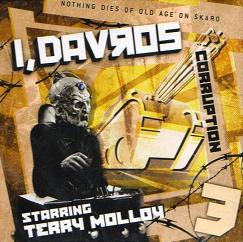
The Daleks are Nazi toddlers, Davros is a sort of Nanny Hitler. The odd thing is that we never really see him in command of the Daleks, not in that Ming the Merciless, Palpatine kind of enthroned way. He skulks in a basement in most of them. I'm not sure what resonates, to be honest. He's visually very distinctive, obviously. I think part of it is that he's constantly plotting against the Daleks, and they're plotting against him.
Richard Thomas: The second edition of "A History" doesn't cover the most recent appearance of Davros in Journey's End, any thoughts on why the Davros we see looks like the Genesis era Davros (plus robotic arm) and not the Emperor Dalek seen in Remembrance of the Daleks? (Other than that Davros looked better.)
Lance Parkin: Well, the robotic arm is obviously the replacement for the one he loses in Revelation of the Daleks, so there's a nod to continuity there. I think the idea of Remembrance is that he's basically just the head in that Emperor casing, everything else has gone, but there's certainly room for the rest of him in there. So I don't see a huge problem. The Time Lords resurrected the Master, so it's only natural the Daleks would come for Davros (again).
Richard Thomas: Thanks Lance, hope we can do this again sometime. Feel free to tell readers where they can find your website and maybe contact you.
Lance Parkin: I've taken the plunge and joined Facebook, so people should feel free to get in touch with me there. I'm also building a website at https://lanceparkin.wordpress.com/
RAED RICHARD THOMAS'S SCI-FI WORLDS COLUMNS FOR BINNALL OF AMERICA
0 notes
Text
We Are the Martians Now!
Back in 1959, British scriptwriter Nigel Kneale turned H.G. Wells' classic 'Martian Invasion' novel The War of the Worlds on its head with the concluding instalment of his landmark Quatermass trilogy: the hugely influential Quatermass and the Pit.
Back then, all science fiction about Martians or similar alien invaders could be broken down into essentially two basic storylines: either we go to them or else they come to us. And in his previous two outings for Professor Quatermass (The Quatermass Experiment and Quatermass II), Kneale had already exhausted both these avenues. However in Quatermass and the Pit, Kneale smashed both these molds and crafted a new third alien invasion scenario: they were here all along!
A full decade before Erich von Däniken's Chariots of the Gods, it was really Kneale who was the first to introduce a mass audience to the concept of "ancient astronauts" that visited Earth in the remote past and might have played a significant hand in mankind's genetic and cultural evolution. Readers not familiar with either Kneale or Quatermass can read my earlier column here. But to summarise the plot in Quatermass and the Pit, basically revolved around a five million year old plan to transform the Earth into a "colony by proxy" for a dying Mars.
In the tale, the Martians were facing a situation not at all that dissimilar to what many fear the Earth may be facing today: the imminent destruction of the Martian biosphere and the total extinction of all life on the planet. In Kneale's screenplay, the ancient inhabitants of Mars attempt to cheat this fate by using their advanced knowledge of genetics.

Kneale's Quatermass stories were just that, stories. But few students of the unexplained could fail to see the parallels not only with von Däniken's "ancient astronauts" but the alien abduction literature too. Referring, of course, to the concept of small insect-eyed creatures experimenting with human DNA and cross human-alien hybridisation.
One of the most important factors that seems to separate good science fiction writers from the truly great, seems to be their almost prophetic knack to somehow accurately predict future events or developments. Perhaps the best example of this being Jules Verne’s 1865 novel From the Earth to the Moon that accurately predicted an American expedition to the Moon more than a century before the Apollo 11 landing. Another good example would be H.G. Wells’ 1936 film Things to Come that much more disturbingly foresaw the blitz of London in World War II . And, of course, Arthur C. Clarke is often credited as being the inventor of the communications satellite.

In his first non-fiction book, After the Martian Apocalypse, the late Mac Tonnies theorised about the possibility that an ancient Martian civilisation might have been responsible for anomalies on the red planet, most notably the so-called "pyramids" and "face on Mars." Given certain similarities between these alleged "monuments" on Mars and those of Ancient Egypt and the Americas: could it be possible that a prehistoric Martian colonisation might have indeed taken place? Also, given the reported three million Americans who believe themselves to be victims of alien abduction, might this colonisation effort still be underway in someway?
Such a scenario - or any involving Martians for that matter - might sound crazy but it would at least go some way to explaining mankind's preoccupation with the pyramids and Mars. The ancient Pharaohs could have chosen any shape for their tombs but they choose a pyramid design, why? Might this fascination with the pyramid shape have been programmed into our DNA, a racial memory of Mars?
Further, the famous Martian rocks that got huge press back in 1996 because they might contain fossilised evidence of extraterrestrial life, has led to the increasing popularity among mainstream scientists that life might have originated elsewhere in the universe (perhaps Mars) and caught a ride via meteorite (or other means?) to Earth. So perhaps the Quatermass hypothesis isn’t so outlandish after all.
Before he sadly passed away last year, Tonnies completed his second book, The Cryptoterrestrials, a book detailing his theories about the possibility that mankind might be sharing the planet with another indigenous race of humanoids. If he had lived, I had planned to ask Tonnies if he thought his Mars ideas and his cryptoterrestrial hypotheses might be compatible in some way, in other words, if Tonnies' cryptoterrestrials might indeed be a Martian proxy colony. Sadly I'll never get the chance now.
Ultimately, as with any paranormal thought experiment, we're left with more questions than answers. And it goes without saying that there is nowhere near the kind of proof that Professor Quatermass is confronted with, i.e. crashed Martian spaceships and dead alien bodies. Well not admitted to anyway. However, if the so-called "face on Mars" really is a face - instead of just a pile of rocks - then it appears to be a human face. Which would mean there would have to be a connection between ancient Mars and humankind. Maybe this is it.
In his recent appearance on BoA: Audio, Christopher Knowles speculated about the link between creativity and shamanism. Maybe in Quatermass and the Pit, Nigel Kneale managed to somehow cross this divide. Then again, maybe Kneale was just what he seemed to be: a damn good storyteller way ahead of his time with science fiction and speculation running through his vanes.
Either way, though, until mankind finally leaves the cradle of Earth orbit and takes their first tentative steps on the Martian surface (circa 2030), the Red Planet will continue to hold onto its secrets ... whatever they may be.
READ RICHARD THOMAS'S SCI-FI WORLDS COLUMN FOR BINNALL OF AMERICA
0 notes
Text
A Sci Fi Worlds Interview with Nick Redfern
Last year, when I interviewed Nick Redfern in Sci-Fi Worlds, he'd teased that one of his next projects was Science Fiction Secrets, a book chronicling the bizarre crossover between the non-aligned worlds of Sci-Fi and the esoteric realms of UFOs, the paranormal and conspiracy theory. This past Fall, the book arrived and I knew it would be a great way to start the science fiction-esque year 2010 with a fresh interview with Nick to discuss his foray into the strange connection between sci fi and esoterica.

Richard Thomas: Just want to start by saying thanks for taking the time to do this interview.
The first thing I wanted to ask you about is 9/11. I remember, in one of your early appearances on BoA: Audio a few years back, you said you were skeptical about alternatives to the official government conspiracy theory that Osama bin Laden masterminded the attacks on the Twin Towers and Pentagon. In the book, though, you dedicate a whole chapter to the pilot for The Lone Gunmen (a spin-off to the popular X-Files series) which astonishingly seemed to predict almost exactly the events of 9/11 *(i.e. planes being hijacked and flown into the Twin Towers). In light of this information, and considering the time that has passed since the event, what is your current opinion on 9/11 and is "government sponsored terrorism" something you think you'll ever look more into?
Nick Redfern: I kind of liken the whole government angle and conclusions relating to 9/11 to be like their conclusions and official reports on the JFK assassination and Roswell: no conspiracy, and all very much explainable. Personally, however - and just like the Roswell and JFK reports - I think there are very big questions that still require answering about 9/11 that just don't sit well with the government's version of events. I wouldn't say I'll never do something about terrorism, but as there are so many good researchers already delving into this area, I think it would have to be something pretty substantial and ground-breaking - and that wasn't being done by anyone else - to make me get involved in that area. There are people far more knowledgeable than me digging into all this field already.
Richard Thomas: I know you now live in Texas, home of Alex Jones, Jim Marrs and the JFK assassination: what's it like to live in what many consider the heartland of "conspiracy culture" ?
Nick Redfern: Yeah, me and my wife, Dana, live in the city of Arlington, Texas, which is about a 25-minute drive from Dallas. Until the summer of 2008 - when we moved to Arlington from Dallas - we actually only lived about an 8-minute drive from the Grassy Knoll! As for what it's like here, well, you obviously get a lot of tourists visiting the Grassy Knoll, Dealey Plaza etc. But, when you live here - I moved here 9 years ago - and after visiting it a couple of times, you kind of just incorporate it into your everyday life. In other words, if I drive along the stretch of road where JFK was shot, I honestly don't now give it much thought any more - I'm more concentrating on watching the traffic and the crazy drivers! That's not to sound cold-hearted, but when you've seen it once or twice, well...you've seen it. It's so small too - I was amazed. You see things like the Zapruder film and it looks like a large, sprawling area. It's actually not though.
Richard Thomas: Regarding Science Fiction Secrets, I recently wrote an article about Dennis Wheatley for BoA, someone you cover in some depth in the book. I focused more on his black magic books rather than science fiction, but how much of what Wheatley wrote about do you think was really just fiction and how much do you think might have been inspired by fact?
Nick Redfern: Well, we can never really know the answer to that question for sure. But, I would say that it's very intriguing that as with Wheatley and several other people I mention in my book - such as Ralph Noyes and Bernard Newman - had ties to the secret world of officialdom, and then went on to write UFO novels, with cover-ups and conspiracies at their heart. So, I don't rule out the idea that some of these people may have uncovered UFO secrets during the time of their links with the government, and then went on to incorporate those same UFO secrets into a fictional setting.

Richard Thomas: One sci-fi classic surprisingly not discussed in the book is 2001: A Space Odyssey. For readers not familiar with the screenplay, it involves the discovery of a mysterious monolith on the moon, very strangely a similar "monolith" appears to be sitting on one of Mars' moons. The first chapter in your book deals with Mars mysteries, so what's your gut opinion on anomalies such as the Phoebus "monolith" and famous "Face on Mars"? Do you think intelligent life could have once lived on Mars and maybe colonised Earth or perhaps vice versa?
You can hear Buzz Aldrin talk about it and see it in this video, jump to about 6 mins in and watch from there.
Nick Redfern: Yes, I do think that there was more to Mars than meets the eye in the distant past. The late Mac Tonnies wrote an excellent and very balanced book on the whole Face on Mars controversy, called After the Martian Apocalypse. For me, Mac presented some very notable data suggesting that there may have been a very ancient Martian culture. And, if they developed space-travel, it's not a big leap to imagine a visitation to the Earth in the distant past.
Richard Thomas: Ridley Scott's Blade Runner is widely considered by film buffs as the definitive science fiction film, the script of which was largely based on Philip K. Dick's Do Androids Dream of Electric Sheep? If you look at the film you'll see that it is lettered with what might best be described as "Illuminati symbolism" (as I covered in a previous column for BoA) what are your thoughts on this strange aspect of Blade Runner and why do you think the FBI were so interested in Philip K. Dick?
Nick Redfern: There's no doubt that Dick was a very paranoid man, and who saw a lot of conspiracy theories here, there and everywhere. That doesn't mean the conspiracy theories weren't valid. Rather, it means that he was so deeply into them that he quite often incorporated them into his work. As for the FBI, they watched him very closely because he claimed knowledge of a deep-underground, covert Nazi-type cabal that he believed was trying to influence people to its cause by infiltrating the world of science-fiction. In other words, he thought this group was trying to recruit science fiction authors who could spread the group's beliefs in a way that might allow impressionable people to be turned to their way of thinking.
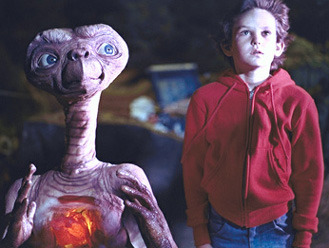
Richard Thomas: Perhaps the film director with the most conspiracy theories surrounding them and their films, though, has to be Steven Spielberg. How much evidence do you think there is to support the rumours that Close Encounters and E.T. were both based on UFO "insider" knowledge?
Nick Redfern: There's no real, hard evidence. If there was, we wouldn't be asking the question now! But, there are a lot of rumours suggesting that elements of the US Government, military and/or intelligence world may have subtly promoted some key elements in both films.
Richard Thomas: Do you think Spielberg's UFO films or sci-fi series such as Chris Carter's X-Files might be part of some kind of official UFO Disclosure Project? If so, how old might such a project be? What are your thoughts on Bruce Rux's thesis that Orson Welles' infamous 1938 radio adaptation of the H.G. Wells classic The War of the Worlds marked the start of a UFO "education program" ?
Nick Redfern: I think it's possible, and I dig into this angle quite a bit in the book. Bruce Rux's theory is definitely an interesting one that deserves more attention. I'm not sure if this is all part of some planned official disclosure - after all, the Welles production is now 72 years ago, so it would have to be a very long operation! I think more likely is the scenario that at an unofficial level, there are people in Government that may have fed ideas to influential people in the science-fiction world, to see what the public reaction is, But, this seems to have been going on for decades; so that's what makes me think that maybe it's like some sort of periodic litmus-test to try and determine where people are at in their beliefs about alien life; rather than a program gearing up to a date and an end-game scenario.
Richard Thomas: Speaking of Wells in Science Fiction Secrets you explore the idea that the Soviets were inspired by Wells' novel The Island of Doctor Moreau to create an army of human-animal hybrids, what are the chances that such creatures were ever actually born and could these experiments be responsible for Bigfoot sightings in Eurasia?
Nick Redfern: Zero! As I note, this was a crackpot project, because gorillas and humans, or chimpanzees and humans cannot successfully mate, at all. It was a strange, surreal and odd project that actually had no hope of achieving any real, meaningful success.
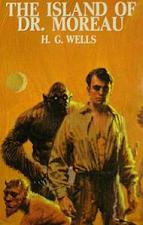
Richard Thomas: H.G. Wells, of course, is famous for writing the first books about alien invasion, time travel and invisibility. However there's one sci-fi concept Wells isn't credited with and that's Star Trek style teleportation or matter transport. With Donald Rumsfeld admitting back in 2001 (on September 10th strangely enough) that the Pentagon was missing $2.3 trillion anything becomes feasible, do you think that teleportation might have been developed clandestinely and if so to what extent? Also what other science fiction type technologies (for example invisibility and time travel) is there evidence to suggest might have been developed in the black?
Nick Redfern: Yes, I think with black-budgets that all sorts of unusual projects have been worked on. I wouldn't be at all surprised if there was a very black-budget alternative space-programme that is quite a bit in advance of what we know publicly about the space-programmes of various nations. I think also a lot of research has been done into invisibility and sophisticated areas of advanced camouflage. Personally, I think the idea that time-travel and teleportation have been successfully developed to where it's 100 per cent understood, functioning and controllable are still stretching things a bit.
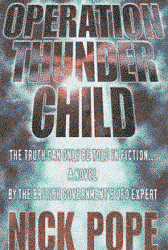
Richard Thomas: Another figure that UFO conspiracy theories seem to follow is former member of the British Ministry of Defence Nick Pope. Back in the early 2000's, Pope, who used to work on the now defunct MoD UFO desk, wrote two fictional books (Operation Thunder Child and Operation Lighting Strike) that dealt with themes of alien invasion and UFO crashes. Do you think Nick was using his insider knowledge or is he just clever enough to make it look like he was, or might it be a case of both?
Nick Redfern: I think Nick obviously used a lot of his own personal knowledge of how the MoD works, and how the military works, to write an entertaining novel of alien invasion. I think it's fair to say that many people are split on whether the cover-up angles of the novel, and if the stories about alien bodies being taken to Porton Down etc are based on anything real, or just Nick incorporating widely-known allegations that were already prevalent in the UFO research community. I think Nick is probably very happy that people are still talking about the book, as a direct result of these scenarios and allegations!
Richard Thomas: Your follow-up book to Science Fiction Secrets is Contactees, which also came out this Fall. Tying these two subjects together, is there anything we can discern from the portrayal of contactees in science fiction?
Nick Redfern: Not really. Contactees is basically a study of the whole Space-Brothers movement from the early 50s onwards. I didn't really uncover anything to suggest a linkage between the official worlds secretly trying to infiltrate the sci-fi world in respect of Contactee cases. However, some people do believe that the 1950s film, The Day The Earth Stood Still was government-related in some way. And, admittedly, the main character in the film is very human-looking, as were the Space-Brothers. And, also as with the Space-Brothers, the alien - played by Michael Rennie - does offer warnings to the Human Race. So, maybe that's a science fiction film we should take a closer look at.
Richard Thomas: Where can people get a copy of Science Fiction Secrets and what else have you got planned for us in 2010?
Nick Redfern: People can get hold of Science Fiction Secrets at all good book-selling shops and on-line outlets too. I have 4 books coming out this year: a UFO book called Final Events; and Monsters of Texas (co-written with Ken Gerhard), Wild-Man and Mystery Animals of the British Isles: Staffordshire, which are all on my other big interest: cryptozoology.
Richard Thomas: Thanks again Nick !!
Nick Redfern: Cheers, Richard!
READ RICHARD THOMAS'S SCI-FI WORLDS COLUMN FOR BINNALL OF AMERICA
0 notes
Text
A Sci Fi Worlds Interview with Lex Gigeroff:
Lexx Co-Writer/Actor
Most of our readers have probably never heard of this very strange Canadian-German and later UK co-production, which is a shame, because Lexx has to be easily the most unique sci-fi series to hit our screens since the original (and best) Star Trek made its debut back in 1966. Not content to do yet another Gene Rodenberry rip-off series and bored by the endless (and often archaic) moralising of The Next Generation and Voyager, the Lexx writers (known as the Supreme Beans) created something totally different and very, very weird.
With its characteristically dark sets and black humour, and operating from the perspective "humans are a flawed species," Lexx was a revolutionary series. Its characters weren't on any spiritual quest to "better themselves" or "save the day," rather, they were motivated by the mundane things that motivate 99.9% of the human race: boredom, lust and hunger. Throw in "the Lexx," a Manhattan sized bioengineered insect craft and "the most powerful destructive force in the two universes" and you had something just as fun as the original Trek but just about as different as you can get too. I guess that's why Lexxicons lovingly still call it "Star Trek's evil twin."
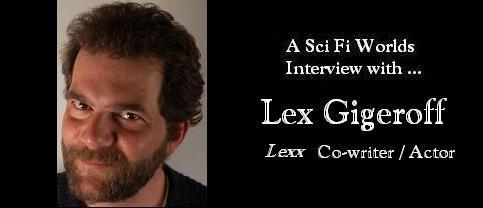
Richard Thomas: First things first, thank you so much for giving the BoA readers the time to answer these questions. I'm a huge fan of Lexx and I'm sure that, after reading this, many of our readers will want to check it out too.

Lex Gigeroff: I had known Paul Donovan for a few years before Lexx, and he approached me about writing for the series after seeing a play I had written/performed in. Paul decided to go with a couple of virtually unknown writers (Jeff Hirschfeld & myself), because there was something in our approach that appealed to Paul's odd sense of humour.
Richard Thomas: In the DVD extras on the TV movie releases I heard you and the other writers say that Ridley Scott's Alien and John Carpenter's Dark Star were big influences. The longer story arcs and extensive CGI (not to mention the chief villain's name "His Shadow" ) might suggest Babylon 5 was at least a little influential too. Also Red Dwarf stars Craig Charles and Hattie Hayridge appeared in season four so I don't know if that series was a influence or not.
What were some of your other influences and are there any sci-fi shows you just hated and wanted to get away from? If so, why and what were you trying to do different with Lexx?
Lex Gigeroff: Dark Star and Alien were somewhat influential -- Dark Star for its anarchy, Alien for its production design. But I can categorically state that Babylon 5 had no influence whatsoever as we never watched it, and to this day I've never seen an episode. I liked Red Dwarf, but can't really say it was an influence. Monty Python had as much of a background influence as anything.
We wanted to get away from the heavy, preachy, moralizing sci-fi of shows like Star Trek: TNG, which in my view took all the joie de vivre out of the original series.
I've always been a big sci-fi fan - but I think my influences tend to come more from writers like Phillip K. Dick and the dystopian novels of J.G. Ballard, rather than the Heinlein-Clarke axis.
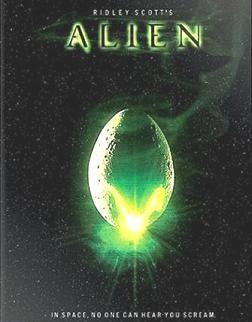
Richard Thomas: Lexx is often called Star Trek's evil twin. I can see why some fans might consider Lexx anti-Trek but personally I think in some ways Lexx is actually a lot closer to the 1960s series than any of Trek spin-offs are. I've heard Lexx creator Paul Donovan talk about being a fan of the original Star Trek so what are your thoughts on this? Were you trying to be a little like the original Star Trek or were you trying to be something completely different?
Also, are you a fan of the original series yourself and, if so, what are some of your favourite episodes?
Lex Gigeroff: There was a sense of fun in the original series, and I think we wanted to try and create three characters as distinctive as Kirk-Spock-McCoy with Kai-Stan-Xev (plus a robot head). I watched the show quite a bit when I was younger, and enjoyed some of its campier moments, i.e. The Squire of Gothos. I also liked the one with the weird head in the sky that turned out to be Clint Howard.
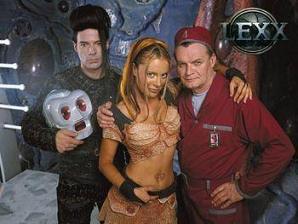
Richard Thomas: Back to Lexx. Given that the show and the ship were both named after you, did you have much input on developing the early mythology of the series, i.e. the Insect Wars, the two universes, cyclic time, proto blood, the Divine Order and, of course, love slaves?
Lex Gigeroff: I had a lot of input conceptually from the ground up, as the three of us really developed the concept and bible following Paul's general brushtrokes. A lot of the 'backstory' went in as a result of our collaboration with Showtime in the beginning, who seemed to want a lot of stuff about 'prophecies', etc. We were a little reluctant about going this route, as we feared it would lead down the rabbit hole of pretentiousness that we were trying to get away from.
I think looking back on it now the thing I'm proudest of is that Lexx wasn't really like anything else on television. Most shows are just rip-offs of other shows, but I think there was something different about what we were doing that made it hard to come up with a good comparison with others shows -- not that it isn't comparable in some aspects to other shows, it's just that we weren't following anyone else's model. So it was, I think, a little unique in that respect.
Richard Thomas: One of the things I love most about Lexx is that all four seasons look very different and distinct from each other, each introducing their own new chief villains: His Divine Shadow, Mantrid, Prince, Vlad, oh and Lyekka and her sisters. Where did the ideas for these head villains come from and do you have a personal favourite?
Lex Gigeroff: Who knows where ideas come from? I liked all our villains, but if I had to pick one I'd go with Mantrid, because there was something just otherworldly strange about Dieter Laser's performance.
Richard Thomas: Mantrid has to be my personal favourite too, the fact that there's so little left of him when we first meet him reminded me a little of my favourite Doctor Who villain, the crippled mad scientist and Dalek creator Davros.

Lex Gigeroff: I think we thought about bringing Dieter Laser back, but it wouldn't have been Mantrid exactly. As we liked to say, "death is never final", which was our excuse for bringing back actors we liked.
Richard Thomas: Lets take a step back a bit. I think out of the four two-hour TV movies the first one I Worship His Shadow is probably my favourite, I loved the holographic show trials and ridiculously severe penalties. What was your favourite of the TV movies and why?
Lex Gigeroff: Hmmm... I guess Eating Pattern for me, because it wasn't quite as burdened with having to deliver back story and setup. Plus I got to hang around as Rutger Hauer's sidekick. But I liked all four.
Richard Thomas: You actually made an appearance in I Worship His Shadow, playing the part of His Shadow's new host body. You appeared in a lot of other episodes too, the crazy surgeon in Tunnels and the sleazy porn director in Fluff Daddy were two of my favourites. What character did you enjoy playing the most in the series?
Lex Gigeroff: I was very happy to play the parts I did. I had the most fun with Dr. Rainbow in Tunnels, but I think my best performance, such as it was, came as the Bound Man in I Worship His Shadow.
Richard Thomas: Probably the most unique episode of Lexx has to be Brigadoom. I have to say I was really sceptical about the idea of a musical episode but it's become easily one of my favourites. Come to think of it there's an awful lot of singing in Lexx, the first episode even starts with the Brunnen-G battle song.
Where did the idea to have so much singing in the series come from and what did you think of it? Also, do you have a personal favourite Lexx song?
Lex Gigeroff: We knew from very early on that we wanted to do a musical, but we had to come up with a good angle on it, which in the end I think we did. I don't really have a favourite song. I sometimes sing Bog is the king of Pattern in the shower.
Richard Thomas: Season three's Battle and season four's The Game are another two of my favourites, I really enjoyed the competition between Kai and Prince in those episodes.
I could go on all day about the different episodes but other than the ones we've already discussed what do you think were some of the best episodes of Lexx?
Lex Gigeroff: I also really liked The Game, 769, Prime Ridge, Stan Down to name a couple. Twilight and Apocalexx Now have their moments as well.
Richard Thomas: A Midsummer's Nightmare is probably my least favourite episode, though, it's pretty funny. Are there any episodes you just dislike or wish you'd done differently in hindsight?
Lex Gigeroff: Sure. Lots of things could have been better if we'd had more time. But I don't have any regrets. Some episodes didn't work all that well, like the one you mentioned and, say, Patches in the Sky.
Richard Thomas: I think I'm right in saying Lexx ended the way you and the other writers always intended, the Lexx blowing up the Earth after four seasons, but not long after the final episode Yo Way Yo went out I remember hearing a rumour that a spin off series about Prince, Priest and Bunny was being planned. Was there any truth to this rumour at all or is this the first you've heard of it?
Lex Gigeroff: There was never any serious talk of a spin-off.
Richard Thomas: If Lexx ever did return for a fifth season or maybe even just a new TV movie, what do you think the story would be about? Would it still be set in the Dark Zone or would the Lexx crew find its way into the mysterious Other Zone? Would Kai be alive or dead? Would 790 fall in love with Stan? Would the bad carrots be back?
Lex Gigeroff: We could have gone back into the Insect Wars, I suppose. But on the whole we were satisfied with the way it ended. I'll leave it to Fan Fics to think up alternate story lines.
Richard Thomas: It's been nearly eight years now since the series ended, personally, I think Lexx has been a little underrated.
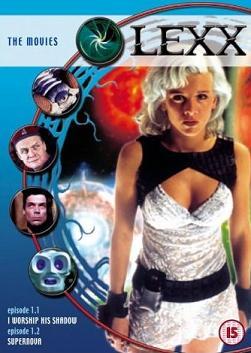
Lex Gigeroff: I don't think we had much influence, if any. I'll leave it up to others to suss out if we were ahead of our time or not.
Richard Thomas: Thanks again Lex, are you working on anything now and/or do you have any websites or anything else you'd like to plug?
Lex Gigeroff: My pleasure, Richard. It's always great to hear that folks enjoyed our strange little show.
I've always got a couple of projects on the hop, and I'm trying to promote my new play, Conrad & Barbara - about Lord Conrad Black and his consort. I've also had a sports-comedy blog for some years which can be found at: www.theobgcommunique.blog.ca
Cheers!
READ RICHARD THOMAS'S SCI-FI WORLDS COLUMN FOR BINNALL OF AMERICA
1 note
·
View note
Text
A Sci-Fi Worlds Interview with Scott Burditt,
Webmaster of Doomwatch.org
Created by Cybermen co-creators Kit Pedler and Gerry Davis, Doomwatch is a largely forgotten cult hit that deserves better. The series centred around a scientific government agency (Doomwatch) responsible for investigating and combating new ecological and technological hazards to mankind. The groups' leader, Doctor Spencer Quist, riddled with guilt for his part in the Manhattan Project and the creation of the Atomic Bomb.

Richard Thomas: First things first, thank you so much for giving the BoA readers the time to answer these questions. I'm a big fan of Doomwatch and I'm sure that, after reading this, many of our readers will be too, so it's really appreciated.
I first heard of Doomwatch because of its connection to Doctor Who and a few years ago I was lucky enough to win a pirate DVD box set on eBay with all the existing episodes. What most impressed me about the series was that it wasn't so much Science Fiction as Science Fact: raising legitimate concerns about the dangers posed by unregulated developments in technology. With the advent of the internet, genetic engineering and stem cell research are problems that have only gotten more dangerous since the series went off the air.
How did you first become a fan of Doomwatch and why do you think the series is still so fondly remembered today, despite the fact that the BBC haven't released all the surviving episodes on DVD yet and there haven't been any reruns in years?
Scott Burditt: I first became a fan of the series in 2004. A friend of mine at the time had VHS copies of a series he thought I might like. I watched The Plastic Eaters and The Red Sky episodes over a couple of bottles of red wine and loved them (and the wine as well!). Always a good way to introduce someone to the series, I think. From that point onwards, I was hooked. I am lucky enough to have the UK Gold repeats of the programme and I even have the infamous untransmitted episode Sex and Violence.
The show only ran for three series in the early 70's, so I am not surprised if people ask, "Doomwatch, what's that?" Those that did see it the first time round, never really forgot it. It achieved impressive ratings for it's first season as it really captured the public's imagination, capturing the fears of potential scientific disasters in the face of progress. It's a fascinating series and is fondly remembered for it's opening episode where a plastic eating virus causes a plane to melt in mid-flight and crash, shortly followed by another potentially fatal flight for Doomwatch's new recruit Toby Wren (played by the frighteningly young Robert Powell) who introduces us to the world of Doomwatch perfectly.
Richard Thomas: There are very few Doomwatch sites on the web and the few there are seem to be in a state of decay, so it was a pleasure to find yours. How did the website first come about and is there anything you're particularly proud of?
Scott Burditt: I set up the website for two reasons: the first was my shared frustration with yourself that there didn't seem to be an up to date website and the second is that I felt that a central location for discovering the series while being able to share views and opinions with others was long overdue. The BBC's Doctor Who is quite rightly well served on the internet and I felt something similar to the sites that fans have built for that series should also be done for this classic BBC TV series. Doomwatch.org is my first ever website and I was determined to build a new community for such an important series. I am most proud of the support I have received since the site was built. A lot of good people have come forward and helped me make this happen and hopefully new people will discover the series and also inquire as to why the BBC have not released it as yet on DVD.

Richard Thomas: Looking back on it, I think my personal favourite episode has to be In The Dark starring Patrick Troughton (the second Doctor) as a man trying to cheat death forever using technology. Sadly, though, he gradually loses his humanity, piece by piece, as he becomes more and more machine, becoming little more than a human head on top of a box of tricks. What is your favourite episode or moment from the series and why? Also do you have a favourite actor from the series?
Scott Burditt: Yes, In the Dark shows a frightening potential future in which people could end up, basically, as Cybermen.
My favourite episode is The Web of Fear. The episodes opens with two minister's sweating in a sauna, how's that for a shocking start! The episode follows the outbreak of Yellow fever, spread by hundreds of blue coloured spiders carrying the disease. The scene where Ridge produces a feather duster to clear away cobwebs and the spiders in order to affect a rescue attempt of a fellow scientist is sheer class.
Simon Oates (Doctor John Ridge) is on top form in this story. Ridge is definitely my favourite character in the series and it is so sad that he died earlier this year. His humour and personality, not forgetting his eye for the ladies proves to lighten the tone in the episodes he features in.
Richard Thomas: Sadly, like the black and white episodes of Doctor Who, most of Doomwatch was lost during the infamous BBC tape purges of the 1960s and 1970s. However, all is not lost as missing episodes of Doctor Who turn up from time to time. If you could pick one lost episode from each of the three seasons of Doomwatch to be found, which would they be and why?
Scott Burditt: From Season One, I think many Doomwatch fans would agree that the return of Survival Code would be most welcome! Mainly to fully appreciate the final episode of the season and the somewhat explosive departure of Robert Powell.
Season Two is thankfully complete but a UK 625 line version of The Web of Fear would be nice, as good as NTSC to PAL conversion is you can't hope to match the original format.
Season Three is a tough one, but I would choose Cause of Death, as this is potentially one of the most touching episodes of the much maligned Season 3, featuring the death of Ridge's father.
Richard Thomas: The creators of Doomwatch Kit Pedlar and Gerry Davis were, of course, also the original creators of the iconic Cybermen of Doctor Who. Personally, I'm a little concerned by what is called 'Transhumanism,' a growing movement advocating upgrading the human race via genetic engineering and similar advances in technology.
It's still a very long way off but I think there needs to be some kind of international law banning the creation of a Trans or Post-human (basically a Cyberman) as well as strong laws limiting the use of the technologies involved. What do you think Doctor Quist's thoughts on the matter would be?
Scott Burditt: This is a fascinating subject. I think, as a scientist, Quist would be fascinated with the concept, but he would be appalled with any execution of it. I am sure he would argue that nature and evolution should ultimately be allowed to decide man's future development. For a start, where do you draw the line? Would only the rich be the benefactors from this? Human's would effectively would make themselves extinct as a species. Kit Pedler thought up the Cybermen, one Summer, when he was out relaxing in the garden and I am sure no one would want to foresee a future where we live as cold unfeeling machines.
Richard Thomas: 'Transhumanism' might be a good topic for a revived series. Back in 1999, Channel Five tried to revive Doomwatch with a TV movie. Why do you think they failed and, if you were writing the pilot for a new series, what would you do different?
Scott Burditt: I think the Channel 5 TV Movie was a missed opportunity. The central plot concerning a man-made black hole was never going to connect with the audience in the same way that stories about drugs, surveillance technology or subliminal messaging did (and still do today). Although exploring the potential dangers in providing an alternative cheap source of power is very Doomwatch. Despite its decent production values and effective and eery music the story is quite frustratingly muddled and never really bothers to introduce the characters properly, so you end up not caring about them. You never get the sense that they are working as a team either. Some aspects, such as the talking super computer with Angels on strings completely jar with the viewer.
I am currently working on a new story for the fanzine with our new writer Grant Foxon, where I have devised a new fan fiction story called The Plastic Rain, which is a direct sequel to Doomwatch's premier story, The Plastic Eaters. In it we see Adam (Our fictional son) of Spencer Quist following his father's footsteps despite a rocky start to his life and eventually the reformation of Doomwatch following the use of the Plastic Eating Virus by eco-terrorists. The story and contents are subject to change, but this is the main premise. Hopefully lots of scenes of melting aircraft, cars and bank cards will feature prominently as the virus accidentally affects members of the public during one of the attacks on government and corporate greed.
Richard Thomas: The original series certainly didn't suffer from a lack of original ideas: plastic eating viruses that can reduce an aeroplane to liquid muck, genetically modified rats that can outsmart a human being, and a plague carrying spiders with Yellow fever venom. What scenarios do you think could most effectively be reused for any revived series and do you have any ideas of your own for possible new ones?
Scott Burditt: There are simply loads, open up any newspaper, they are all there in the open, ready to use! Doomwatch lives on in print and on the internet. The news in general loves downbeat doom and disaster stories, so obviously the public must do too!

Scott Burditt: I think a new Doomwatch night on BBC4 would be fantastic. An updated documentary would be welcome and, even if they couldn't, stretch to a new episode of Doomwatch. I believe they could make a new story from the memories and recollections of Dr. Fay Chantry (featuring Jean Trend), possibly telling Adam Quist (our fictional son of Doctor Spencer Quist) of his fathers exploits and heroism, which would feature sections of the series seen as flashbacks.
I will ask BBC4, but I suspect the answer will be no. The DVD release of the series has been mooted since 2006 and it still hasn't been scheduled. Apparently some research work has been done for a potential DVD release, but there are still some issues holding up a release.
Richard Thomas: Whatever the BBC plans are, I know you're planning to celebrate Doomwatch's 40th in style. How is work on the fanzine going and what are some of the things you have planned already?
Scott Burditt: As I mentioned before, "The Plastic Rain" will feature heavily. I am a great believer in fresh new content. As far as I know there has never been a fanzine produced for the series and I hope to provide a high quality glossy product that will also be available to order from the website. I will add interviews and stories as they are fed to me. It's quite exciting stuff!
Richard Thomas: Thanks again Scott. Tell our readers where they can find your website and get your forthcoming fanzine? It might be a good idea to let any potential writers for the fanzine know how to contact you too.
Scott Burditt: The website can be found at www.doomwatch.org
If anyone would like to contribute to the fanzine or the website, you can contact me directly at [email protected] or personally at [email protected]
I will post up the information on the fanzine nearing it's completion date (should be ready for February 2010 in time for the 40th Anniversary) I hope people enjoy finding out about this fascinating series.
READ RICHARD THOMAS'S SCI-FI WORLDS COLUMNS FOR BINNALL OF AMERICA
0 notes
Text
Outbreak! Predictive Programming and Sci-Fi Pandemics

It's this alarming accuracy and almost prophetic track record that should have even the most casual or sceptical of listeners more than just a little concerned about what Jones is now predicting for the next decade or so … a series of staged global pandemics and compulsory vaccinations. Each designer outbreak, and accompanying jab in the arm, deadlier than the last with the ultimate Illuminati Endgame of a worldwide population reduction of between 80 to 90%. This gigantic, almost pagan-like, sacrifice to Mother Earth that would put even Christopher Lee's Lord Summerisle (The Wicker Man, 1973) to shame. (Anyone who chooses to believe that a vaccination couldn't possibly be dangerous to your health should read this)
What more ... as if this apocalyptic future wasn't nightmarish enough already … Jones goes further, suggesting that we've all been secretly conditioned already, practically since birth, to accept this 21st century mass culling through predictive programming in sci-fi films and television shows. The idea being, of course, that if the species is pre-programmed via fiction to sub-consciously associate apocalyptic plagues, Third World Wars and yes European or even Global police-states with the future, then when these things finally do occur the masses will be more inclined to just accept them as the natural course of history and so fail to resist them. Absurd you say … maybe but that doesn’t make it wrong, people would have said the same thing about planes being deliberately flown into buildings … perhaps only time will tell one way or another.
However, given Jones' past successess … not to mention the current swine flu hype in the mainstream corporate media and the push to forcibly vaccinate everyone in the US, Britain and other countries … only a fool wouldn't at least consider that the documentary film maker could be right about this one too. There certainly isn’t any shortage of disturbing government/medical precedents that should give people reason for concern: the infamous Tuskegee Syphilis Experiment being perhaps the most damning, not to mention forcing US pilots to fly through radioactive mushroom clouds in the early Cold War and even contaminating New York City’s subway system with dangerous anthrax simulant in 1966.
Whatever the truth, though, global pandemics definitely seem to have been a regular stable of science fiction going right back to when the genre was first conceived. Remember, in H G Wells' ever popular novel The War of the Worlds (first published in 1898) it's a virus that, perhaps suspiciously, finally defeats the Martian invaders. You can read our previous article H G Wells and the New World Order for more thoughts on Wells and his writings.
Lethal viruses, of course, were also a major element of another famous British sci-fi writer, Terry Nation, the creator of the Daleks and the cult series Blake's 7. Several of Nation's scripts for television centered around the idea of a deadly new virus bringing civilization to its knees. Most notably, in Nation's 1964 Doctor Who serial, The Dalek Invasion of Earth, it's a mysterious space plague brought to Earth by meteorites that paves the way for the Dalek conquest of a severally weakened mankind.
Also, maybe a little disturbingly, despite the six part Dalek epic taking place sometime after 2164 the narration on the BBC trailer suggested the story took place in the year 2000! Oddly enough Tom Baker's incarnation of the Doctor later reaffirmed this date when interrogated by the evil Dalek creator Davros in 1975's Genesis of the Daleks. Further, in a classic scene between Baker and Davros the mad scientist even threatens to create a virus capable of destroying all life in the Cosmos. Cold and calculatingly whispering then madly ranting of the God-like power over life and death that would give him: "Yes. Yes. To hold in my hand, a capsule that contained such power. To know that life and death on such a scale was my choice. To know that the tiny pressure on my thumb, enough to break the glass, would end everything. Yes. I would do it. That power would set me up above the gods!"
It might sound a little ridiculous to suggest all this might have been an attempt to prepare the generation growing-up in the 1960s and 70s for a series of global pandemics today, but it certainly doesn't contradict the idea and, in an age where there were still only three channels in Britain, most of the country would be watching.
In 1975, the same year Genesis of the Daleks was first broadcast, Nation also revised the super pandemic idea for his popular series Survivors. As the series title might suggest, the cult classic followed the struggles of a small band of survivors in the wake of a mysterious pandemic that annihilates almost all of the world's population. Interestingly, if not even a little alarmingly, Survivors was remade by the BBC in 2008 which might lend some extra weight to the idea that we're all being prepared for something big coming down very soon.
In Hollywood, too, we certainly haven't seen any shortage of apocalyptic type films involving the outbreak of a killer virus or global pandemic these last few years. 28 Days Later and its sequel 28 Weeks Later, of course, being two of the most blatant examples. In fact you could include most, if not all, of the zombie and vampire sub-genre films. You might even include Children of Men. While the reason why humanity has become sterile by 2028 might never be explained, it ties in perfectly with the theme of population reduction.
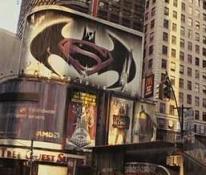
It's Will Smith's 2007 film I Am Legend which has to take the prize for being the most worrisome though. Directly mirroring the dark warnings of the conspiracy theorists, in the film it's a new experimental vaccine that's responsible for the pandemic and resultant collapse of civilization in the first place. More troubling still, the Batman vs. Superman publicity poster seems to strongly hint at the film taking place in our real world in the not too distant future.
Perhaps we're just seeing patterns in things that aren't really there ... it's still too early to know one way or another. Regardless, though, people need to take the concerns of researchers like Alex Jones very seriously and do their own research before taking any vaccine rushed through by any government. Particularly in the case of here in Britain, where this is the same Labour government that lied to us about weapons of mass destruction. A lie that has killed over a million people now in Iraq, do we really want to let them stick a needle in our arm because they say it's safe?
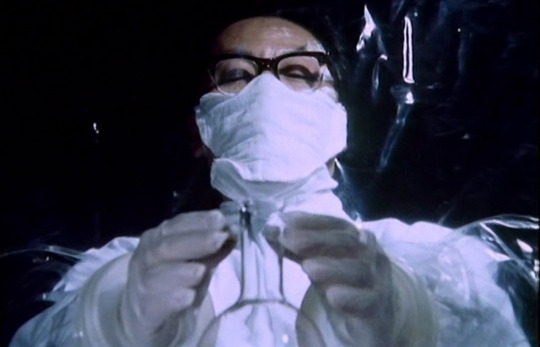
READ RICHARD THOMAS'S SCI-FI WORLDS COLUMN FOR BINNALL OF AMERICA
0 notes
Text
Alien Bad Guys: A Sci-Fi Worlds Top Ten
I originally intended to conclude my loose "paranormal trilogy" in this fortnight's Sci-Fi Worlds, but since the first two installments were featured in Room 101 I thought it best to save part III for there too. So instead, since I'm writing this over the Easter holidays, I thought I'd take it easy a little with a Sci-Fi Worlds Top Ten Alien Bad Guys instead. All just my opinion, of course. Maybe people could post their own top 10 on the BoA forum.
Romulans, Sontarans, Cybermen, The Dominion, Davros and the Daleks are just some of the baddies doing battle to claim top prize as our number one villain in the world of science fiction. Read on and find out ...

10) The Romulans (Star Trek)Homeworld - Romulus and RemusAffiliation - The Romulan Star Empire
Forget the Klingon Empire it was the Romulans who should have been the main protagonists during James T. Kirk's three year reign in the captain's chair. The violent and militaristic Vulcan off-shoots giving the original Enterprise crew one of their very best episodes (if not the best) when they made their début in Balance of Terror.
9) The Minbari (Babylon 5)
Homeworld - Minbar
Affiliation - The Minbari Federation
The Next Generation had its moments but Babylon 5 is the true successor to the original Trek, inheriting some of the best Original Series writers that so obviously influenced B5 creator J. Michael Straczynski.
More casual B5 fans are probably thinking "why are the Minbari in the list? Weren't they good guys?" Yes, for the most part in the series they were, but in the best of the TV movies In The Beginning (which tells the story of the Earth-Minbari War that took place ten years prior to pilot episode The Gathering) they come within a hare's breath of exterminating all humanity in their "Holy war" against the Earth Alliance.
8) The Sontarans (Doctor Who)Homeworld - SontarAffiliation - The Sontaran EmpireRobert Holmes is often celebrated in Doctor Who fandom as the very best of the classic series writers, writing all time greats like The Talons of Weng-Chiang, The Caves of Androzani and even the Master's début story the Terror of the Autons. However, it was Holmes' creation of the Sontarans that arguably had the biggest impact on the show. The cloned warrior race being the only Doctor Who monster to invade (on screen) Gallifrey, the Doctor's Homeworld.
7) The Cylons (Battlestar Galactica)Homeworld - Cylon HomeworldAffiliation - The Cylon EmpireCold and calculating. The war machines ruthlessly wiped out and conquered the Twelve Colonies of Mankind in less than 24 hours. What more could you want. (Read my Battlestar Galactica piece for more of my thoughts on the Cylons.)
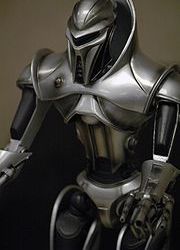

6) The Borg (Star Trek)Homeworld - Unimatrix One, located in the Delta QuadrantAffiliation - The Borg CollectiveOne of those moments I was talking about above. The Borg saved The Next Generation and the whole Star Trek franchise from total extinction when they kidnapped and transformed Jean-Luc Picard into Locutus of Borg in The Best of Both Worlds.
Single-minded (quite literally, they have a group or hive consciousness) and utterly relentless in their quest for "perfection," this cyborg collective is the ultimate threat to the United Federation of Planets. In the words of the entity Q: "The Borg are the ultimate user. They're unlike any threat your Federation has ever faced. They're not interested in political conquest, wealth, or power as you know it. They're simply interested in your ship, its technology. They've identified it as something they can consume."
5) The Cybermen (Doctor Who)
Homeworld - Mondas (destroyed)
Other Planets
- Telos
- Planet 14
- Parallel Earth
Affiliation - The Cyber Empire
The original Borg. The Steel Giants from Mondas were assimilating humans before it was cool. Enough said.

4) The Alien, also called the Xenomorph (Alien franchise)Homeworld - unknown (first encountered by the crew of the commercial towing spaceship Nostromo on LV-426, Zeta Reticuli star system)Affiliation - noneThe most realistic looking extraterrestrial species ever shown on the big screen and perhaps the only truly terrifying one. The "Perfect organism. Its structural perfection is matched only by its hostility … A survivor... unclouded by conscience, remorse, or delusions of morality."
3) The Dominion
(Star Trek: Deep Space Nine)
Homeworld - The Founder's home planet, located in the Omarion Nebula, Gamma Quadrant
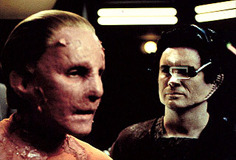
Important Members & Allies of the Dominion- The Founders, aka The Changelings (the "Founders" and ultimate heads of the Dominion)- The Vorta (the Founders' cloned intermediaries acting as Dominion administrators, diplomats, command staff, and scientists)- The Jem'Hadar (the ultimate warrior race and shock troops of the Dominion)- The Cardassian Union- The Breen Confederacy

2) The Shadows (Babylon 5)Homeworld - Z'ha'dum, aka Alpha Omega 3 (destroyed)Affiliation - unknownAn ancient force of conflict and chaos, the very essence of evil. Shrouded in mystery and armed with technology a million years ahead of 23rd century Earth (not to mention the coolest looking ships on TV) the Shadows were easily the best alien race in what many consider the best space opera series ever made.
1) Davros and the Daleks
(Doctor Who)
Homeworld - Skaro, aka D5-Gamma-Z-Alpha (destroyed)
Other Planets
- 22nd Century Earth
- Kembel
- The Ogron home planet
- Spiridon
- Necros
Affiliation - The Dalek Empire
The post of supreme alien bad guys has to go to Davros and his ultimate achievement the Daleks. Brilliant but utterly lacking in conscience, without soul or pity, the mutant madman Davros created the Daleks in his own image. Programmed to "conquer and destroy" all other forms of life the metal monsters soon turned on their creator though and thus began their ethnic cleansing of the Universe.
Together, Davros and the Daleks are the ultimate Who allegory for evil. The only two Who villains to consistently have the Doctor on the ropes. The Dalek's conquering Earth not once but twice (at least) and even being responsible for the deaths of two of the Doctor's on screen companions. Not to mention the near extinction of the Doctor's own people the Time Lords.
1 note
·
View note
Text
A Sci Fi Worlds Interview with Richard Freeman
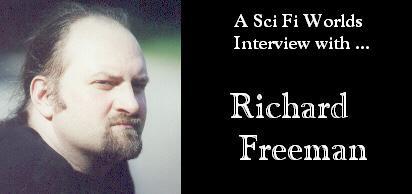
Richard Thomas: Welcome back! Thanks for agreeing to do part II of this special two-part text interview. Part I for Room 101 got a lot of great feedback so I'm sure the BoA readers will be looking forward to this one.
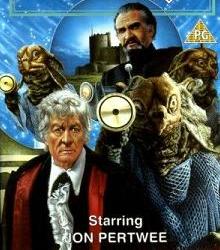
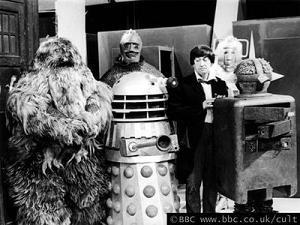
Richard Thomas: Here here!
The two most successful monsters have to be the Daleks and Cybermen. What are some of your favorite stories featuring them and did you get goose bumbs like me when they finally faced off in Doomsday?
Richard Freeman: I always thought the Daleks were better than the Cybermen. Cybermen have no emotions and hence cannot be evil. Daleks are all that is worst about humanity boiled down into its most intense form. This with their totally inhuman form and tank like invulnerability make them very frightening. A Dalek kills for spite not logic.
The best Cyberman story I think was the recent Rise of the Cybermen / Age of Steel. They finally looked like they could actually do some damage for once, rather than just looking like men in silver suits. Once again, of course, the woefully poor Star Trek ripped off another Doctor Who monster with their pathetic looking Borg. The Cybermen have been around since 1966 and would kick the Borg's collective arse!
I loved Army of Ghosts / Doomsday. The return of the Daleks at the end of the first episode is my favorite cliffhanger in the show's history. The fight was a forgone conclusion though. We all knew who would win in a Dalek / Cyberman punch up. The bitchy banter between them was great!

Richard Thomas: One of the best remembered monsters of the black and white era has to be the Yeti robots of the Great Intelligence. Later in the series, the Loch Ness monster appeared in Terror of the Zygons. Personally I think this is great because it gets the young viewers interested in these topics, but as a cryptozoologist what are your thoughts on mixing fact with fiction?
Richard Freeman: Doctor Who, and the Jon Pertwee years in particular were my inspiration to become a cryptozoologist. The show was my first real exposure to monsters. I don't mind mixing fact with fiction as long as it is stated that it is fiction. I don't like 'mockumentories' that try to pass themselves off as real investigations.
There have been a couple of really bad Loch Ness programs. One built up the idea of the monster as a prehistoric marine reptile then tried to make itself look clever by saying how such a creature could not live in Loch Ness. Ergo the program's message was that the monster, if it existed, had to be a plesiosaur. Plesiosaurs could not live in Loch Ness so there was no such thing as the Loch Ness Monster. This is bollocks. Nobody who has seriously studied the phenomena thinks the monster is a plesiosaur. The smart money is on some kind of huge fish possibly a giant eel.

As for mystery apes, I think the orang-pendek of Sumatra will be found first as its jungle habitat shrinks. These small, upright apes will often enter semi-cultivated areas near to villages. The mighty Yeti, in the vastness of its remote mountain forests, will probably escape discovery for quite some time.
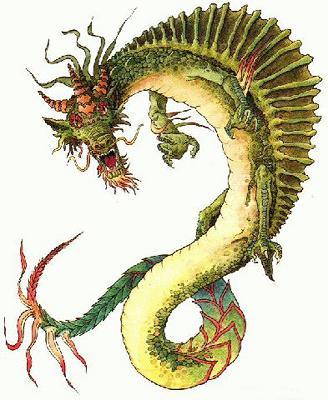
As for a setting there could be many choices. I could base it around the Chinese legend of the Ying-lung, a winged dragon who killed the Chinese god of war (distorted memories of the battle with the Time lords). Or I could set it in modern day Japan as a tribute to the Godzilla films. Huge dragons rampage through Tokyo and create thought form servants that recall the yokai (ghosts and monsters of Japanese legend) such as the kappa, tengu, mouryo, oni, yunki-onna and so on. Or I could set it in rural England where a Wicker Man style cult worshiping a slumbering dragon plan to awaken it.
Richard Thomas: Two monsters rumored to be returning sometime soon are the Silurians and their aquatic cousins the Sea Devils, the original reptilian rulers of planet Earth. If you were writing their return story what would you do?
Richard Freeman: I would have the Tardis land in what the Doctor thinks is modern day London only to find that it is a tropical jungle full of dinosaurs. The Sea Devils and Silurians now rule the Earth and are doing a better job of it than humans!
Richard Thomas: While on the topic of Doctor Who's Earth Reptiles, what are your thoughts on Mac Tonnies' controversial cryptoterrestrial hypothesis?
Richard Freeman: I had never heard of the guy before you mentioned him. I have never bought the extraterrestrial hypothesis. The so-called 'aliens' are generally too humanoid looking to have evolved on another biosphere. If 'alien' encounters are objective events (and that's a big if) I think the creatures are coming through time or dimensions rather than from outer space. There seems to be a strange analogue with fairy lore as well.
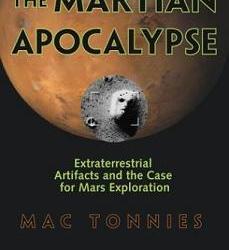
Richard Thomas: That's probably the most likely scenario but I wouldn't rule out the idea that Mars might have been colonized by an advanced civilization millions of years ago. Kind of like the backstory to the Pyramids of Mars. Why not remind our readers again about your upcoming books and stuff.
Richard Freeman: I have two books out now, Dragons; More than a Myth? from CFZ Press and Explore Dragons from Heart of Albion. My new book The Great Yokai Encyclopedia; an A to Z of Japanese Monsters will be out later this year from CFZ Press.
You can follow my cryptozoological expeditions at www.cfz.org.uk
Richard Thomas: Thanks mate, hope we can do this again sometime.
READ RICHARD THOMAS'S SCI-FI WORLDS COLUMN FOR BINNALL OF AMERICA
0 notes
Text
A Sci Fi Worlds Interview with Nick Redfern
After my Doctor Who piece came out in issue four of Alien Worlds, I was pleasantly surprised to learn that UFO and Cryptozoology author Nick Redfern thought it was "excellent," which really made my day because I've read and enjoyed so much of his work over the years. So, following the success of my Sci-Fi Worlds interview with Nick Pope (where I got Pope's take on Doctor Who and other cult shows) I thought it might be interesting to do another interview in a similar vein with the "monster hunter," himself.
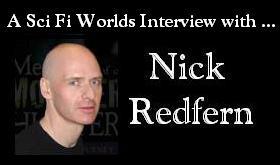
Richard Thomas: First thanks for agreeing to do this interview so soon, its not that long since our Room 101 interview so its much appreciated.
Nick Redfern: No probs!
Richard Thomas: When I was about five or six my dad bought me a two video pack of the 1975 Tom Baker stories The Sontaran Experiment and Genesis of the Daleks. After that I soon started watching Sunday morning repeats on UK Gold. Can you remember how you first became a Doctor Who fan?
Nick Redfern: I wouldn't say I'm a big fan of Doctor Who; as I don't think I've actually watched it since Tom Baker finished, aside from one or two episodes of the new series in about 2006. I saw the one with Peter Kay and the guy out of Hustle, and I thought that was a very good one. I did enjoy it as a kid, and particularly with Jon Pertwee. I can't really remember much of it now, just a few fragments of certain episodes from the time. Thirty years ago is a long time! I'm sure I got interested, though, like most kids of my age back then, from watching it at teatime on a saturday night.

Richard Thomas: Growing up in the 1990s I'm from the generation of children that was cheated out of having their own Doctor by the BBC. (Unless you count the 1996 Paul McGann TV Movie.) Who was your favourite Doctor growing up and what do think made him unique compared to the others?
Nick Redfern: I'd definitely say Jon Pertwee. He was flamboyant and adventurous, and a bit eccentric, and had an old vintage car he drove around in; and I liked those aspects of it all. He wasn't a typical James Bond-type; and that was good. There's way too much lazy thinking in TV, where people won't take a chance, and many of the characters are very stereotypical, and I think the character of Doctor Who has always been the exact opposite of this. Jon Pertwee's was a very memorable Doctor Who. I don't remember the people who came before him, and never really watched it after Tom Baker. Of the couple of episodes from the latest series I've seen, I thought it was pretty good.
Richard Thomas: The Jon Pertwee/Tom Baker years are often considered the golden age of Doctor Who, what are some of your favourite stories from this era and why?
Nick Redfern: I remember the Sea Devils one, one with Daemons, and one set at Loch Ness. I suppose I remember them mainly because of my interest in Cryptozoology. Plus, I'm not really much of a fan of sci-fi; and have never been interested in things like Star Wars; Battlestar Galactica; etc. If I ever watch sci-fi, it's mainly conspiracy-type sci-fi set on Earth, like The X-Files, The Invaders, Kolchak etc, which is probably why I liked - and remember - these specific episodes and stories of Doctor Who.
Richard Thomas: For me the scariest thing about the Daleks and the Cybermen is the fact that both species were originally humanoid beings much like ourselves. This is a bit of a weird question but with the transhumanist movement and futurists like Ray Kurzweil talking about a nearing "Technological Singularity" do you think we have anything to fear from Davros-like mad scientists on Earth?
Nick Redfern: I actually remember Davros well; because when I was at school we had an old wrinkled teacher who looked just like him! LOL. And that's what we nicknamed him. As for having things to fear from similar, real-life scenarios like this, I'd say that as technology and medicine progresses, it's vital that it's kept in check. Yes, we definitely need to advance as much as possible in a positive way; but we also have to ensure we don't cross the line into darker areas, such as down the road to "designer children" and things like that where so-called modifications might start to be made at the genetic level. Our scummy leaders might like a whole nation of identical, subservient types born out of a test-tube, but we definitely need to stay away from all that.

Richard Thomas: If the Daleks and Cybermen ever wiped each other out for good who do think would emerge as the new Doctor Who king of monsters?
Nick Redfern: How about the Chupacabras?
Richard Thomas: As a monster hunter yourself, if you were ever asked by the Doctor Who production team to suggest or even invent a new adversary for the series what do you think it would be?
Nick Redfern: As above, I'd say the Chupacabras. Having been on several expeditions to Puerto Rico looking for it, I don't think for one minute that the Chupacabras is really some sort of pet or secret experiment of aliens. I think those theories are all laughable bollocks. But that scenario, of a vicious alien Chupacabras coming to Earth, and maybe finding its way to Britain, would be a very good one for a fictional TV show. If the production team want help, I'm here!

Richard Thomas: From the Yeti and the Loch Ness Monster to Erich Von Daniken's Chariots of the Gods, Doctor Who seems to have borrowed a lot from Cryptozoology and Ufology. As a successful author in both these fields what are your thoughts on this?
Nick Redfern: I think it's actually very cool. There are a lot of people in the fields of Ufology and Cryptozoology who whinge and moan when the subject is portrayed on TV, because they get very self-righteous and pompous about how they think it should be shown on-screen. I've even seen people complain when a fictional TV show changes - for example - some aspects of a famous case, such as Roswell. But these people need to get lives; they need to lighten up, and realise that TV-fiction is simply that: an entertaining story and nothing else. People should be able to watch a show that totally fictionalises a real event - if it's presented as fiction, and everyone realises that's what it is. As far as specifically crypto on TV is concerned, I love Primeval. I always watch that show. In fact, I'd say - for me, at least - it's the best paranormal type fiction show since when The X-Files was at its height. I particularly liked the last season finale with the Mammoth on the M25; that was a good one.
Richard Thomas: As well as the paranormal Doctor Who has also taken a lot of inspiration from cult sci-fi and horror films. I understand your a big zombie film fan, what do you think it is about them you like so much and what is your favourite zombie film?
Nick Redfern: I'm not sure I could say this or that is my definite favourite; it would depend on the mood I was in at the time. But, yeah, I love zombie films. I have a huge collection of them. I think, for me, and like a lot of people, part of the appeal is the whole apocalyptic nature of the stories. It's interesting that since the late 60s, zombies have been tied with end of the world type themes. But before that, you never really saw that. Rather, before then, it was just zombies here or there, and in a relatively normal setting. But, today, you rarely - if ever - see a zombie film that isn't connected to the end of the world, or some huge disaster. The two have become interconnected. But I like that.
28 Days Later was a very good one (although technically they aren't zombies, but are still alive and just infected with the "Rage Virus"); but I hated the ending of 28 Days Later. It was far too upbeat. They should have all got infected too. I don't wanna watch a zombie film where the hero and his girlfriend ride off into the sunset and everyone's happy. I want to see them get bitten, change, and then go on a zombie attack themselves. Or just get eaten and die in pain as the zombies tear them apart. A good night's entertainment! And I thought that Shaun of the Dead was excellent! It's difficult to do really good zombie-comedy, and Shaun is definitely the best example of how to nail it.
Richard Thomas: George Romero's Night of the Living Dead is one of my favourite films. Why do you think Romero's Dead films are so popular compared to other zombie films including remakes of Romero's original trilogy by other directors?
Nick Redfern: Well, I think he really cornered the market, and defined that whole aspect of the zombie outbreak leading to the collapse of civilisation, and he did it very well and in a unique way. I was a bit disappointed with Land of the Dead. But I liked his latest Diary of the Dead. He made a name as the definitive zombie filmmaker; and that will always be the case too, and that's great. He deserves it and earned it. But, in saying that, there have been some other very good ones. I love Italian horror films, and there's been a lot of good stuff come out of that whole genre too. It's not really zombies, but one of my all-time favourite horror films is Carnival of Souls (the 60s original.) That's a great film. As is Night of the Demon and Dead of Night.
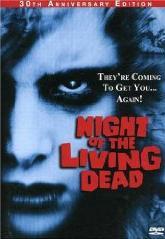
Richard Thomas: The last few years have seen something of a revival in the zombie genre with films like 28 Days Later and its sequel, I Am Legend and Romero's fourth and fifth Dead films. Why do you think we've had this sudden rash of apocalyptic zombie films?
Nick Redfern: Well, I think it's pretty simple: part of it is that filmmakers and studios see a successful film or theme, and they follow a similar path, whatever the subject matter. If someone makes an apocalyptic zombie film and it's a big hit; then others follow suit. Same with werewolf films; or war films, or gangster films, etc. I did not like I Am Legend at all though. It wasn't terrible; it was just okay. But I was hoping for more than okay. Will Smith played the survivor role well. But I think we should have seen much more about the build-up to the disaster, how the virus spread, etc. The ending was wrong; and should have been very bleak; and not one that gives hope to people. Zombie films should never give any hope of any kind. Zombie films should be relentless right up to the last shot.
Richard Thomas: Your also a big fan of The Invaders, a 1960s X-Files-esq series starring Roy Thinnes as man desperately trying to warn the world about a covert alien invasion already underway. Why do you think your such a big fan of The Invaders as opposed to more well known series from the 60s like Star Trek or The Avengers?
Nick Redfern: Well, I'm more into conspiracy type TV things than sci-fi; and even though The Invaders was technically sci-fi, it was more about paranoia, conspiracies, cover-ups and dark secrets here on Earth. Frankly, TV shows with futuristic spaceships, with laser guns, and with people running around in silver suits on far-off worlds bore me shitless.

Richard Thomas: The Invaders seems to have been influenced somewhat by paranoid 50s films like Invasion of the Body Snatchers and Quatermass 2. Are you a fan of these or other paranoid sci-fi at all? And what do you think of the parallels with David Jacobs' theories presented in The Threat?
Nick Redfern: The Quatermass films were pretty good; and particularly Quatermass and the Pit. Yeah, I like to watch paranoia-type sci-fi. They Live was one I would put into that category which I enjoyed a lot. I also liked Lifeforce, from 1985, which blended sci-fi and a zombie outbreak in London. That was a very weird one, but an intriguing story, too. That's an interesting question re Jacobs. I actually see nothing positive about abductions; and see it all in a very negative light - as far as our role in abductions is concerned. Cattle being used is the term that comes to mind for me. All this stuff about how it's for our own good, and will help us, is crap. Whoever or whatever the kidnappers are, they have done nothing at all to help us - ever. If I ever see one of those little black-eyed bastards and I have a gun, I will blow it's head off. That's the way to welcome these creatures that do nothing but use us, exploit us, penetrate our airspace and suspiciously lurk around military bases for whatever reason. To me, they aren't a direct threat in the sense they are going to wipe us out. I think it's worse: we might be like cattle: reared and used.
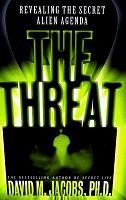
Richard Thomas: As someone who writes about UFOs and related subjects have you ever felt a little like the character played by Roy Thinnes in The Invaders yourself?
Nick Redfern: LOL. A bit! I do get around a lot doing investigations and travelling about; and on-the-road investigations have a lot of intrigue and adventure attached to them. So, yeah, in that respect. But, unlike the David Vincent character in the show, I've never been shot at by aliens or been on a UFO! Maybe one day though!
Richard Thomas: I understand you had the chance to meet Roy Thinnes once. How did you meet? And did you manage to get his take on UFOs or anything like that?
Nick Redfern: Yeah, I did; and he's a really cool guy. We met at a TV shoot about 3 years ago. He was very down to earth, no ego, and was happy to chat and hang out. Yes, he's very interested in UFOs, and knowledgeable too. There's a few other people from TV sci-fi I've met too, and who were cool to chat with, and who were refreshingly completely lacking in all that Hollywood "don't talk to me" bullshit. One was Dean Haglund, who played Langly - one of the Lone Gunmen - on The X-Files. Like me, he's a big Ramones fan, and we had a good chat about music and stuff. The other was Chase Masterson, from Star Trek, and a lot of sci-fi films, who I hung out with for a couple of days last year.

Richard Thomas: What are your plans for the future? Are you working on any new books or has anything grabbed your attention recently?
Nick Redfern: I'm working on a couple of books: one on a US Government think-tank that investigated alien abductions back in the 80s. Also, a book on mystery animals of Staffordshire, such as sightings of big-cats, phantom black-dogs, etc. And I have a book coming out later this year that I think you will find interesting titled Sci-Fi Secrets, which is a study of how the worlds of official secrecy and sci-fi have crossed paths.
Richard Thomas: Sci-Fi Secrets sounds excellent, hopefully we'll be able to do another interview on that sometime. Thanks again.
Nick Redfern: Cheers Richard; you're welcome.
READ RICHARD THOMAS'S SCI-FI WORLDS COLUMN FOR BINNALL OF AMERICA
0 notes
Text
Four Years of New Who

After 26 seasons, the original series was axed in 1989, leaving a whole generation of children without their own Doctor and only video releases and UK Gold repeats to fill the void. Then in 2003 (the 40th anniversary year of the series) came the exciting news that the BBC were going to revive Doctor Who. So, four seasons on, how has the new series done?
When fans first heard that Doctor Who was coming back, many were worried that the series would either make the silly mistake of changing too much and alienating the fandom or, more dangerously, changing too little and confusing new viewers. It is often argued that the reason the old series was cancelled in the first place was because it became a fan show bogged down in its own continuity, instead of a family show for everyone. Fortunately, it looks like the new series has somehow managed to walk this tightrope incredibly well, resurrecting old favourites, inventing new ones and adding to the epic mythology of the program instead of becoming trapped by it.
Over the last four years, we've witnessed the return of legendary monsters like the Autons, Daleks and Cybermen; as well as the Doctor's nemesis the Master; and old allies UNIT, Sarah Jane Smith and robot dog K-9. But each time the new series has revived popular elements like these from the Doctor's past, it has done so in a way that both changes them enough to make them relevant to today, while at the same time staying true to the original concept. The program has successfully recycled old Cold War creations for a post 9/11 world and much more technological age.
Perhaps the most obvious example of how the new series has done this has been the reintroduction of the Doctor's greatest foes, the Daleks, to the series. The new metallic bronze design of the Dalek machines stayed true to what a Dalek is and built upon it, when the temptation must have been to totally redesign them. More significantly though, who and what the Daleks are meant to represent seems to have been updated in a similar way.
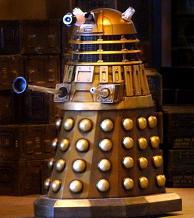
In the original series, Dalek creator Terry Nation made it clear what his steel creations represented. When the Daleks first appeared in 1963, WWII had only been over for 18 years and the memory of the Nazis and their crimes was still very much fresh in people's minds. The links between the Daleks and Hitler's Third Reich were made particularly obvious in the 1964 story The Dalek Invasion of Earth, where the Daleks occupy mid-22nd century Earth. In the story, the Daleks organise (like the Nazis had) slave labour camps, use Nazi terminology like "extermination" and are even seen giving their own version of the Hitler salute. Also, later in the 1975 story Genesis of the Daleks Nation introduced a very Fuhrer-like Davros as their leader.
When they returned in the new series, it was made equally clear what the Daleks were now meant to represent. In a move that both updated the Daleks for modern audiences but also echoed what were probably Nation's original intentions, the Daleks were changed from Nazis to symbols for the new evil fresh in peoples minds: radical religious fundamentalism and terrorism.
This change is probably most prevalent in season one of the new series. For instance, in Dalek we encounter a lone Dalek soldier, who after being tortured by its American captors (in an attempt to quite literally make it talk) escapes and exterminates most of them. And, if the parallels here with the War on Terror and Guantanamo Bay weren't already strong enough, the story ends with the escaped Dalek 'terrorist', in effect, committing suicide by blowing itself up.

Much like the Daleks, the Doctor's second most popular enemies, the Cybermen, were similarly updated when they returned in season two of the new series. Originally created in 1966 by the writing team of Dr Kit Pedler and Gerry Davis, the Cybermen made their first appearance in William Hartnell's last story as the Doctor, The Tenth Planet. They went on to make numerous returns in the series, with a decapitated Cyber head even appearing on display in Dalek.
Interestingly though, the Cybermen we meet in the new series come from a parallel Earth and have nothing to do with the old series' Cybermen: who originally came from Earth's long lost twin planet Mondas. Despite this change, the new series' Cybermen probably reflect the original premise of their creators better than the old ones ever did. Making it graphically clear who and what they are meant to be... humans who had had their humanity surgically removed and replaced with cold technology.
In the age of the Internet, mobile phones and iPods, where we're all becoming increasingly dependant on technology, this fact is probably more relevant now than ever. It could even be argued that because of our growing obsession with technology, that we're all, in a way, becoming Cybermen ourselves. A point not missed by the new series in Rise of the Cybermen and The Age of Steel, where we see how a parallel Earth's obsession with the latest upgrade eventually leads to the mass conversion of the population into Cybermen.
It would be a big mistake to think the new series writers are afraid to add to the Cyber mythos though. In the 2008 Christmas special, The Next Doctor, they not only continued to stay loyal to the original vision (for instance, having the Cybermen invade London again) but also introduce two new variants of Cybermen: the wraith like cybershades and the powerful CyberKing, a Cyberman Dreadnought style battleship with the capability to convert millions into Cybermen as the steel giant strides through the streets of London.
Another good example, of course, is the Master, who was brought back in season three of the new series. Out of all the Doctor's old enemies to return in the new series, probably none have changed more than the Master. Which is perfectly acceptable, because, like the Doctor, every incarnation of the Master (a fellow Time Lord with 12 regenerations) should be unique. All the key characteristics of the Master are still there, he is still an evil genius and psychopath with dreams of universal dominion, only now instead of simply being a renegade Time Lord ... he's the British Prime Minister and dictator of Earth. Perhaps we should ask if the Master has regenerated into Tony Blair?

This is a joke of course, but in The Sound of Drums and Last of the Time Lords there is definitely something very reminiscent of Blair's run about the Master's reign. From the music the Master plays during the Toclafane invasion, to the fact that everyone voted for the Master in the first place because what he had to say sounded good at the time and no one can tell you why. Not to mention, both come to power on a wave of unparalleled popularity and both become universally unpopular after an unjust invasion and occupation. Blair invading Iraq and the Master using the Toclafane to conquer Earth.
Perhaps the most interesting change to the Master though has been the character's new sense of humour. Mirroring Tennant's Doctor the new Master jokes and makes light of tense situations, turning one of the Doctor's greatest strengths against him as well as making the parallels between the two more clear. Not only making the Master more accessible to new audiences but also tying in well with the old series, where the Master was often shown to be the Doctor's parallel and where it was even sometimes hinted that the two are somehow mutually dependent on each other. In the old series the Doctor even went as far as saying: "He's a Time Lord. In many ways, we have the same mind".
But if the Master has changed the most, then the villain to change the least has to be Davros in season four's The Stolen Earth and Journey's End. This is excellent because why change such a timeless character that works so well? Perhaps taken this attitude onboard Julian Bleach gives an outstanding performance as the mutant madman which is eerily similar to Michael Wisher's original and best portrayal of the character in Genesis of the Daleks. The problem with Davros in later stories was that he became too prone to ranting hysterically, Bleach takes the character back to Wisher's much softer and more contemplative style of speech which is far more effective and genuinely chilling.
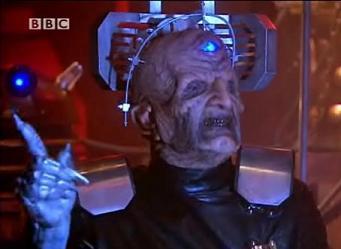
Interestingly, the Daleks also seem to go back to their roots in the story. Behaving more like Nazis again instead of terrorists: conquering planets, experimenting on prisoners and even going as far as speaking German for the first time.
So four seasons on, the new series has managed to walk the dangerous line between pleasing new audiences and fandom incredibly well. Resurrecting and reinventing old series' favourites for modern times, making them more relevant to today but in a respectful way that echoes the intentions of their original creators. After four successful years, the new series is taking a small break with season five being broadcast in 2010. No doubt it will be equally successful as long as it continues to use this formula. Until then, though, we have the Easter and other specials to look forward to.
READ RICHARD'THOMAS'S SCI-FI WORLDS COLUMN FOR BINNALL OF AMERICA
0 notes
Text
A Sci-Fi Worlds Interview with Nick Pope
Back in the first edition of this new sci-fi column (available in issue 4 of Stuart Miller's Alien Worlds magazine) we examined the ongoing phenomenon that is Doctor Who. So when I had a chance to interview Nick Pope for Room 101, about his UFO work for the MoD, I was delighted to discover that he shared my love for this epic series and sci-fi in general. The icing on the cake, though, was when the two-time sci-fi author quickly agreed to do an interview for Sci-Fi Worlds where we get his thoughts on Doctor Who and touch on some other classics.
So what does a real life Brigadier Lethbridge-Stewart (though I'm not sure about Nick's rank) have to say on the Whoniverse and other sci-fi worlds?

Richard: First things first. Thanks for agreeing to do this so soon after my last interview with you for Room 101. In that interview we centred on your UFO work for the MoD, so here it will be interesting to do a sci-fi focused interview. As a successful sci-fi author yourself I'm sure you will be able to answer my questions and no doubt intrigue our readers too.
You've written two excellent sci-fi novels, Operation Thunder Child and Operation Lightning Strike. In our Room 101 interview you said: "As a successful sci-fi author myself I've been greatly influenced by Doctor Who." Which stories in particular do you think have influenced your sci-fi work the most?
Nick Pope: Although my two sci-fi novels are - on the face of it - about alien invasion, I wanted to get away from a one-dimensional good versus evil conflict. I wanted to blur the lines and make people think about the moral issues. While it's difficult to nail down particular Doctor Who stories as an influence, a central theme of morality run through the show as a whole. I guess the idea of the military being in the frontline is common to my novels and to any of the stories featuring UNIT.
Richard: In our other interview you also said that: "I'll always look back on Genesis of the Daleks as the all-time classic story. I'd love to see this remade or revisited in some way." I'm a big Genesis fan myself, why do you think so many fans continually pick this as their all-time favourite Doctor Who story?
Nick Pope: A number of reasons. Tom Baker was one of the greatest Doctors and the three way dynamic between the Doctor, Sarah-Jane and Harry worked very well. The daleks have always been popular villains, so the story was bound to appeal. But Genesis was more than just another dalek story - it was the story of the creation of the daleks and the central question of whether the daleks could be instilled with a sense of morality, or destroyed, made this a 'high stakes' story. Other highlights included the introduction of Davros and the Doctor's moralizing over his right to destroy the daleks. Finally, I think people enjoyed the parallels with the Nazis: a brutal, militaristic society in a total war. Genetic experiments. Genocide. The uniforms and the salutes. All this and more was present, with Davros as Hitler and Nyder as his Himmler.
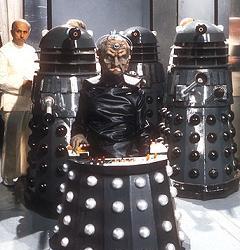
Richard: Season four of the new series saw the return of the Daleks and their evil genius creator Davros. Why do you think they continue to be so popular with younger audiences?
Nick Pope: With CGI and a bigger budget, we can have more sophisticated-looking daleks and more of them. And now we have the fix to the 'they can't get up the stairs' issue. But again, I think the popularity reflects the fact that they are the ultimate Doctor Who villains: aggesive, ruthless, persistant and without any pity.
Richard: I think the first four Doctors will always be iconic. Whose your favourite Doctor and why?
Nick Pope: People often ask this and ask the same question about James Bond. Popular wisdom is that the answer is usually "the first one you saw". I started watching when it was Jon Pertwee, but eventually I came to prefer Tom Baker, who until recently was my favourite. But Doctor Who is now so polished that Christopher Eccleston took over the top slot ... until David Tennant joined. David, to me, is the best Doctor. I just think his acting is brilliant. He perfectly portrays the sadness, the loneliness and the detachment that are so central to the Doctor's character, but also the strength and sense of purpose. He brilliantly shows the audience the quiet "fury of the Time Lord".
Richard: Personally my favourite Doctor Who adversary has always been the Cybermen. The Moonbase, Tomb of the Cybermen and The Invasion are easily some of the best black and white stories, which is loudly echoed in the new series. With the Cybermen returning again this Christmas what do you think it is about them that still scares children so much? Why do you think the Cybermen have survived in the age of CGI special effects?

Nick Pope: I think there are parallels with the Daleks. People like the continuity of villains that return again and again. It gives the writers a chance to develop themes that couldn't really be included in a one-off story, such as the wider evolution of a race. But the idea that they were once humanoid, but transformed themselves into these cyborgs is scary. It's a case of "they're like us ... but not like us". Something green with tentacles is obviously alien, but maybe the Cybermen are a little 'too close to home'.
Richard: After Genesis of the Daleks, The Daemons is often said to be the best of the classic Doctor Who adventures. The way this and other classic stories like The Pyramids of Mars tied Erich von Däniken's theories into Doctor Who makes for an interesting mix of mythologies. What do you think of this?
Nick Pope: I think it's very clever. It was tapping into the popularity of such ancient mystery books in the Seventies, largely started by von Daniken. The Nazca lines get a mention in Death to the Daleks, as I recall. And we can't have mention of The Daemons without quoting the Brigadier's classic "Jenkins, chap with the wings there, five rounds rapid" line.
Richard: Two of the most memorable monsters not yet to return in the new series are the Silurians and their aquatic cousins the Sea Devils: the original reptilian inhabitants of planet Earth. Curiously, Doctor Who and the Silurians came out in 1970 the same year as Ivan T. Sanderson's Invisible Residents: The Reality of Underwater UFOs was first published. Do you think it might just be possible that another intelligent species like the Silurians or Sea Devils could have evolved right here on Earth? (ala the cryptoterrestrial hypothesis)
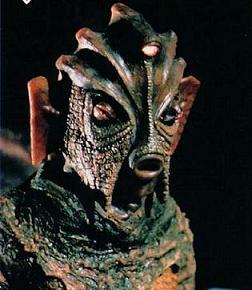
Nick Pope: Well, I hope these monsters are brought back at some stage! I reference the cryptoterrestrial hypothesis a fair bit in my first sci-fi novel, Operation Thunder Child. There are plenty of USO (Unidentified Submerged Object) reports and many UFO sightings where an object is seen over water, so who knows? I'm not hugely attracted to the cryptoterrestrial hypothesis, but I certainly can't rule it out. And as the saying goes, we arguably know less about the deep ocean than we do about the Moon or Mars.
Richard: Doctor Who and the Silurians ends tragically with the Brigadier blowing up the Silurian base. As someone who used to work for them, hypothetically how do you think the MoD would deal with a species like the Silurians or Sea Devils in the real world?
Nick Pope: Obviously I can't discuss specific details of Rules of Engagement, but in general terms I think I can say that if attacked, we would respond with proportionate force. However, in any contact with an extraterrestrial (or cryptoterrestrial) civilisation the key strategic objective would be to open lines of communication and facilitate peaceful contact. Secondary objectives would include information exchange, with a particular emphasis on science and technology.
Richard: In the following Jon Pertwee story, The Ambassadors of Death, Great Britain not only has a manned space program but also already sent men to Mars. As someone with an interest in space how far away do you think this was from reality at the time?
Nick Pope: This story was broadcast fairly shortly after the Apollo 11 moon landing, so there was immense public fascination in anything to do with space, coupled with a feeling that we'd all be holidaying on the moon by the end of the century. Those within government, however, would have been well aware that a manned space programme was quite beyond the UK at the time, both in terms of technical capability and, critically, finance. We still spend far too little on space, given the huge benefits to be reaped in terms of resources and knowledge.
Richard: Jon Pertwee's best enemy was easily the Master. What did you think of Derek Jacobi's and John Simm's portrayals of the character in season three of the new series?
Nick Pope: Both are brilliant actors and both were excellent in different but complementary roles that brought out that mixture of charisma and menace that defines the character of the Master. The scene where John Simms dances to the Scissor Sisters song "I Can't Decide" was outstanding.
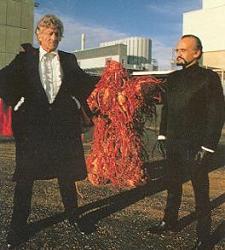
Richard: I think Robert Holmes (who wrote the first Master story Terror of the Autons, as well as Pyramids of Mars and many other classics) will always be thought of as the best of all the Doctor Who writers but its starting to look like Steven Moffat might well give him a run for his money. I'm very much looking forward to his time as lead writer and executive producer beginning in 2010. What do you think?
Nick Pope: Russell T Davies will be a hard act to follow, but Steven Moffat can do it. The Empty Child/The Doctor Dances, The Girl in the Fireplace and Blink were some of the best stories since the relaunch of Doctor Who, as was Silence in the Library/Forest of the Dead, so this all bodes well for the future. There's a darkness and a poignancy about his stories that I like (e.g. the "she's ghosting" scene from Silence in the Library) and another thing that appeals is that he's a writer who deals really thoughtfully with the philosophy of time travel.
Richard: Stories like Spearhead from Space, Ark in Space and The Lazarus Experiment seem to have been heavily influenced by Nigel Kneale's Quatermass serials. Interestingly, David Tennant also appeared in the BBC's 2005 remake of The Quatermass Experiment just before he became the new Doctor. What do you think of this mix? Why do you think Nigel Kneale's fiction continues to inspire writers even today?

Nick Pope: I agree that some of the Doctor Who stories have been influenced by Quatermass, probably because some of the Doctor Who writers watched Quatermass when they were younger. Quatermass and his British Rocket Group even get namechecked in a couple of Doctor Who stories. There are clear parallels between the two shows and in particular the idea of a clever, moral but quirky character facing down all manner of alien threats, despite the odds being stacked against him. Sci-fi is arguably dominated by big budget Hollywood movies, so Kneale's work (like Doctor Who) appeals to us because there's something very British about it.
Richard: I grew up in the 1990s when Doctor Who was sadly trapped in the void known as UK Gold. However, there was another show on the BBC that sent me running to "hide behind the sofa." That, of course, was The X-files. What did you think of the way the series incorporated the UFO mythology into its own storylines? For instance, Roswell, Area 51, abductions, MJ-12 and even the Face on Mars are all worked into the series.
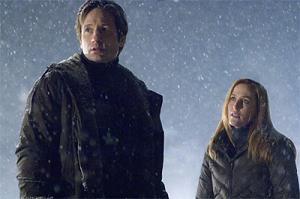
Nick Pope: Skeptics often say UFO witnesses and abductees may be influenced by sci-fi, but if anything, the reverse is true. The X-Files is the classic example and the writers clearly did their research and borrowed freely from the UFO/abduction literature. I was hired by 20th Century Fox to do some of the PR for the new X-Files movie, I Want to Believe. As well as giving a number of media interviews I was commissioned to write material on real life mysteries and conspiracy theories, which was then used in various newspaper and magazine features that came out in the run up to the movie's release. I met David Duchovny and Chris Carter at the UK premiere and Chris already knew about my government work on UFOs. The X-Files is a brilliant creation and when they 'do' UFOs, they do it really well.
Richard: Do you foresee any new esoteric mysteries becoming a part of the sci-fi canon, much like abductions and Face on Mars have?
Nick Pope: Well, the disappearing bees got a mention in Doctor Who recently and all sci-fi writers will keep an eye out for real life mysteries. I think the big one to watch is 2012 and the associated mysteries and theories that surround the Mayan calendar. The sci-fi movie 2012 will be released next year and I'm sure the whole 2012 issue will crop up in other sci-fi books, movies and TV series.
Richard: Would you like to write more sci-fi yourself? Perhaps your sci-fi books might make interesting audio books. Any plans or thoughts?
Nick Pope: I'd love to write more sci-fi and at some stage, a third novel to follow the previous two. But I'm too busy with TV and promotional work at present to write another book. Operation Thunder Child was previously optioned by Carnival Films and a screenplay was written, but the project stalled. Operation Thunder Child and Operation Lightning Strike are currently being looked at by a major Hollywood studio, with a view to making them into a blockbuster sci-fi movie.
Richard: Thanks again, as always I look forward to your future media appearances, books and other projects.
Richard Thomas, BoA UK Correspondent and Columnist.
READ RICHARD THOMAS’S SCI-FI WORLDS COLUMN FOR BINNALL OF AMERICA
0 notes
Text
Battlestar Galactica - Sci-Fi and the Terror Wars
Very sadly Stuart Miller's Alien Worlds magazine "will not be published again." Although short lived, I really enjoyed my time working with Stuart and am very proud to say I wrote for AW. In a field largely trapped in the 1990s (if not the 1950s), it was fresh, young and innovative, not afraid to seek new answers to old questions or even ask new ones. Perhaps the best evidence of this is the fact that Stuart was prepared to take a gamble and give new writers like me the chance to show what they can do. For those who don't know, I wrote a sci-fi/TV related column called Sci-Fi Worlds, my first piece was on Doctor Who and is available in issue 4 of Alien Worlds. Anyway, before I got the sad news about the magazine I had already written a second piece on Battlestar Galactica so I thought it might be a good idea to publish it here at BoA instead. Hopefully you'll find it thought provoking, even if you disagree with some of my views.

Unlike the new series of Doctor Who, the resurrected Battlestar Galactica is not a continuation of the classic story but rather a total re-imagining of it. Like its counterpart, the new series begins with 12 colonies of humanity getting savagely attacked and ruthlessly wiped out by the Cylons. A relentless and calculating race of war machines that appear hell-bent on the complete annihilation of all mankind. The Cylons' holocaust leaves only a handful of survivors. A ragtag fugitive fleet, 41, 402 people desperately trying to escape their cybernetic hunters and clinging to the hope of finding the legendary 13th colony called Earth.
But other than this shared back story, the two series have surprisingly very little in common. This is a good thing, because the original descended into little more than a childish action adventure, especially when compared to the more serious, adult drama and post 9/11 allegory which is the new series.

Perhaps the most interesting and, by far, the most disturbing parallel with 9/11, however, is how the survivors behave in the wake of the tragedy. Of course, just as in the wake of 9/11 in the real world, we witness incredible courage, as well as a stubborn determination to continue in the face of terrible adversity. But, we also sadly see how fear, fueled with a legitimate need for revenge, can bring out the worst in people, changing victims into criminals, the terrorized into terrorists, and moving society closer to the evil it is meant to be opposed.
Interestingly, the post-9/11 parallels are completely turned on their head in the third season. In the miniseries, as well as season one and two, the Cylons are clearly meant to represent Al Quada and fundamentalist Islam, whereas the humans clearly parallel America. However, in the shadow of the Anglo-American invasion and occupation of Iraq, these roles seem to have been somewhat reversed during season three. The bad guy Cylons become the invading westerners and the humans take the place of the Iraqi insurgency.
Much of season three takes place on what the colonials name "New Caprica": a cold, remote and hostile world that most humans decide to settle on after abandoning their vain search for Earth. However, they are eventually found and, strongly echoing real world events in Iraq, invaded and occupied by the Cylons one year later.
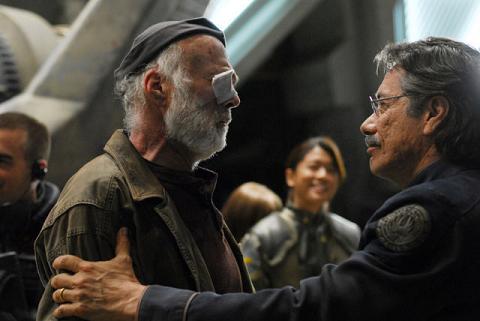
Moreover, strongly paralleling the Iraqi Police Service created in the immediate aftermath of the 2003 invasion, the Cylons establish the New Caprica Police: a group of human volunteers who work for the Cylon authority to establish law and order within the settlement. The NCP are considered nothing more than Cylon collaborators and traitors by the resistance who, again like their counterparts in Iraq, even go to the extremes of using suicide bombers in their campaign against the Cylons.
Another interesting parallel with Iraq, of course, is the role religion plays in the conflict on New Caprica. The Cylons worship what they call the "one true God," whereas the colonials have many different gods. This is perhaps a loud echo of the religious differences between a predominantly Christian America and Muslim Iraq.
It should be stressed that in earlier seasons the monotheist Cylons were obviously meant to conjure up images of Osama bin Laden and radical Islam. However, during their brutal occupation they more immediately brought to mind another band of dangerous religious fundamentalists... George Bush and the Christian Evangelical right that supported his mad crusade in the Middle East. Like the Cylons (or even bin Laden) they used God to justify their immoral war.
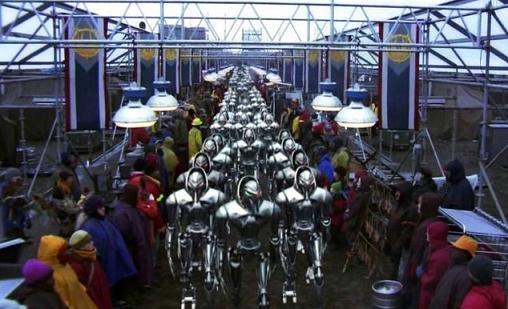
Similarly, many people sadly supported the 2003 invasion because they were beguiled into believing our troops were fighting to free Iraq from an evil dictator before he could develop weapons of mass destruction and threaten, paradoxically, international peace. Disastrously though much like the Cylons, far from peace all we've done is throw Iraq dangerously close to civil war and terrorized the Iraqi people.
Five years on from its relaunch, the writers of the re-imagined Galactica have to be congratulated. It would have been easy to write a more simplistic series with, like the original, everything presented in distinct black and white terms of good vs evil and no shades of grey. Instead, they created a highly compelling post 9/11 allegory, a mirror for our troubled times that shows the Terror Wars, warts and all. Hopefully, the rest of the series and the planed spin-off Caprica will be equally brave and thought provoking.
READ RICHARD THOMAS'S SCI-FI WORLDS COLUMN FOR BINNALL OF AMERICA
9 notes
·
View notes
Text
The Human Factory - Sci-Fi Worlds Short Story #1

Previously published by Bretwalda Books, The Human Factory is the first entry in the new Sci-Fi Worlds short story series, which will feature original science fiction stories in the same vein as the Golden Age or ��pulp” era of science fiction.
The copyright was recently returned to me, so below is the complete text:
The Human Factory
A Sci-Fi Worlds short story
by Richard Thomas
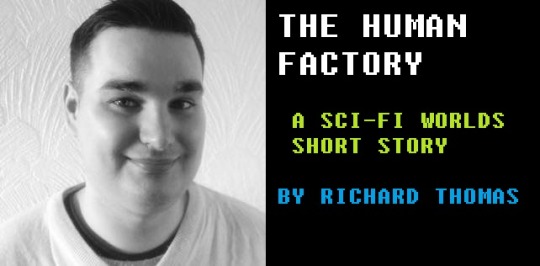
Introduction
According to Greek mythology the Titans Prometheus and Epimetheus were told to distribute characteristics to the newly created animals. Epimetheus started giving a positive trait to every animal, but lacking foresight, he realised that he had distributed all traits without having any left to give to man. So, Prometheus gave mankind the civilizing arts and fire. In the 21st century this task of assigning special traits to humans and animals has finally been completed by genetic designers. Thus, the Epimetheus experiment has moved what was once only ancient myth to today's reality.
-- A Brief History of the Post-Human Age (Elizabeth Icke, 2068)
In 2029 the first artificial womb is created by a team of Russian and Chinese scientists. The following year the Greater People's Republic of China successfully 'births' the first dog using extrauterine fetal incubation. It is believed that the new technology will help solve China's massive gender imbalance that has left 29 million Chinese men without any prospect of marriage within that nation.
By 2045, natural births are outlawed by all 150 members of the United Earth States. They call this the Epimetheus Project. It is the beginning of a brave new world where gender, sexuality, occupation and even life expectancy are all assigned before conception; a future where no one is born and humans are instead manufactured in factories to meet the needs of supply and demand of the big twelve corporations.
At the end of the 21st century childhood has become a thing of the past and is looked down on by social planners and other historical scholars as the cause of many of the social ills that plagued earlier centuries. Instead of growing up, people simply wake up with implanted memories of a fake childhood tailored for the needs of their designated role in society.
While crime inside UES has largely been eliminated following the ban on natural births and enforced memory implants for felons, illegal emigration from the 50 nations and Mars colonies still outside the global superstate’s control, make maintaining a police force a continuing necessity. In the Anglo-Zone, police officers all have the same surname, Smith. There are only six types assigned to public duties, three women and three men: Julia, Yvette and Sarah; and Mark, Adam and David. So they are easily recognised by the public each of the same types are identical to each other and all share the same basic memory programming. Deviation from your memory programming is considered rebellion. Rebellion is not tolerated and has serious consequences.
Part One: Happy Birth Day David
“Now I do not know whether I was then a man dreaming I was a butterfly, or whether I am now a butterfly, dreaming I am a man.”
-- Zhuangzi, The Butterfly as Companion: Meditations on the First Three Chapters of the Chuang-Tzu
DATE: 4/07/2096
LOCATION: FACTORY 108
ANGLO-ZONE
“Three month incubation period complete... time to wake up!” Squawked the loudspeakers attached to the central computer terminal.
Green liquid began to pour over the sides of a bath-like chamber, and a figure started to move inside. Confused and disoriented the figure coughed and looked around to see other chambers, all the same, with other people, some still sleeping others waking up like himself.
A mobile computer unit wheeled towards him with a towel to dry himself with and clothes to wear. “Please leave your incubation chamber now. You are David Smith 8338”, the strange bot on wheels told him.
David looked in amazement and terror at the intruder and his strange surroundings. “What? Who? Where am I? Who am I?” his first words.
The factory machine answered the confused new human being: “You are David Smith 8338. This is Factory 108 owned by the Strix corporation, your employers and creators.”
David looked baffled at the black and yellow striped machine, which resembled a motorbike with a laptop in place of the handlebars. With an almost patronising tone, the machine continued to explain things: “You have been designated 35 years’ service as a law enforcement officer and five years retirement before termination. A life partner will be assigned to you after the completion of your four memory implants in eight weeks’ time.”
David was speechless. “I can see you're still confused, don't worry”, it unsuccessfully tried to reassure the scared newborn adult. “You will have access to your initial memory implants in just a few moments, and then you will understand everything you need to know.”
“Happy birth day”, the machine added, before zooming off to the next chamber where another 'newborn' waking up in the human factory.
Putting on his new uniform, David's memory implants began to activate. Although he had never put on a pair of trousers or shirt before, he remembered doing it and had no difficulties changing out of the wet suit attached to wires and cables he had been sleeping in. Dry, changed and his first memory implant fully functioning; he headed for the exit not needing any directions from the computers, throwing his towel and wetsuit in the bin as he left to begin day one of his 14600 day lifespan. A Strix corporation bus was waiting outside to transport the birth day men and women to their living quarters to start their predetermined lives.
Part Two: Welcome Home David
DATE: 18/07/2096
Looking at his reflection in the mirror David studied the stranger's face looking back at him. Not having received all of his memory implants yet there were still massive gaps in the newborn's mind, and he was still getting used to the face in the mirror. About six foot tall with a stocky rugby player physique; David had dark brown hair and hazel eyes which seemed to be turning green as the days passed. His skin was lightly tanned. Two weeks had gone by since David had woken up in the human factory, and the young adult had began to settle into his life and apartment. Not that time to settle was necessary. David's initial memory implants, which had been administered to him during his three month incubation period before his activation, included full knowledge of his dwellings as well as local knowledge he would need. For instance, where the local Strix owned supermarket was, as well as who his neighbours would be.
Like David, his new neighbours were also Strix employees and had been programmed with full knowledge of the new David Smith model moving into the building. Older people who had been naturally born and experienced a real childhood, instead of the artificial one David had been given, would find it bizarre that not only did David already know people he had never really met, but also had friendships and even a long running feud with one of them. The genetic designers that had synthesised David's memories believed that as a law enforcement officer, David would need previous experience of human conflict, so an enemy was included in his programming.
Despite both David and his 'enemy', a John Davis supermarket model, having full knowledge that neither of them had actually met before and that the misunderstanding between them was entirety fictional; the two still avoided each other and couldn't shake their mutual mistrust and loathing. The strained situation had caused David to avoid the supermarket and shop in a small store owned by an old-fashioned 'birther', someone had been born before 2045 before natural births were made illegal.
“What you doing in here?” asked the owner and manager of the store. “No one phoned for the police.” He looked about 60 years old, though the grey haired little man could of been much older, the glasses he wore certainly suggested that. He might as well have been wearing medieval armour; eyeglasses had been obsolete since the Twenties, thought David. Like the store and the goods he sold the old man was an anachronism that didn't fit anymore in a world where machines built people in factories instead of the other way around. The store, which sold everything a 'crazy birther' would need from non-genetically engineered food to old fashioned paperback books, was aside from David and the owner completely empty and felt more like a museum than a shop.
“I'm not on duty”, David politely explained. “Actually I've only had two memory implants; I still have seven to go before I'm ready to start policing... I'm not qualified yet, have no memories of police investigations or anything.”
“That so”, the scruffy dressed old man replied. “Oh I saw a documentary about it. I was born the old fashioned way. I never had any memory surgery. You guys start life at about 25 don't you?”
“Ah...physically yes”, David explained. “It is true we're born with the body of a 25 to 30-year old, but when you first wake up, you only have the lifetime experiences of someone who had been living about ten years. You get the rest later. I'm up to about 18-years lifetime experiences now. Tomorrow I'm getting my next implant that will take me to about 30. Then I'll be ready to get my police training memories and start duty... can't wait.”
“Really; and what if you decide you don't want to be in the police?”
David looked in horror at the dissenter.
“Ah that would be rebellion... and even if it wasn't everything I am, my design, home, even my wife I haven't met for real yet, everything was paid for by Strix on the understanding I'd be a police officer wasn't it.”
Smiling the old man walked towards the store counter. “Let me show you something.”
The old man pulled a small painting from underneath the counter. “You see that. Now that is real art. Not that computer drawn rubbish Strix puts up in apartments like yours.”
The painting showed a group of desperate looking people clinging onto a raft at sea, as a ship sailed away in the background. In the bottom left corner was the title, 'The Raft of the Medusa'.
“I studied art in school, when I was in comprehensive, before they were all closed because there are no children to teach any more. It isn't the original, of course, just a copy. I keep it here with some others just to remind me.”
“Remind you of what?” David asked feeling uncomfortable. “Should have gone to the supermarket”, he mumbled to himself.
“You haven't really lived, so you can't understand. I'll try to explain... just because the ship is sinking you don't throw people overboard. I keep it here to remind me of that.”
David looked at the faces of the men and women in the painting set adrift. As a police officer model, he understood a crime had been committed against the people on board the raft, but what could that have to do with anything?
“Okay. I think I get it now”, he lied wishing it was true.
“Really; you shouldn't you know?” Puzzled and delighted the old man pointed to the back of the store. “Well we sell this and some other paintings; they're at the back of the store with the arts and craft stuff, if you're interested.”
David looked at the old paintings, there were three in total: a tree losing its leaves in the winter time; an elephant forced to do circus tricks; and a child going to one of those schools the old man had told him about. He felt something but couldn't explain what they meant in words.
Against his better judgement David picked up some paper, paint and brushes and took them to the counter. “I think I'll make my own instead.” He told the astonished manager.

Part Three: Rebellion
DATE: 5/08/2096
Over a month had gone by since David had woken up and he had completed his last memory implant the day previously. His new wife, who he remembered losing his virginity to in college, even though he had never really met her yet or been to college, was due to arrive later that evening. Although it would be their first real meeting, to David it felt like she was just coming home from work. It would be the same for her. She was another police model, a Sarah Smith: a redhead with greener eyes than David, Sarah was thin and fair skinned with freckles.
David was glad he wouldn't need to visit the memory implant chair any more, like trips to the dentist they could be painful and make you anxious. The procedure involved implanting a syringe through one of the nostrils into the brain. Not a pleasant experience, even though it only took seconds. A mistake could mean a complete memory wipe would be necessary, or worse early termination.
Three weeks had passed since he had bought the paint and brushes. Those paintings he had been shown still left David feeling uneasy about something but his mind couldn't verbalise it. He knew it was something to do with his own situation, but couldn't figure out what exactly. It was as if the answer was being blocked from his mind.
In an attempt to understand David was using his detective programming. He had decided to create his own paintings in an effort to solve the mystery. David knew that technically what he was doing was rebellion, but reasoned since he was programmed to be an investigator; technically he wasn't going against his programming by painting was he?
Hours went by and David began to see. Slowly what had been just an instinctive feeling was becoming a thought he could verbalise and understand. He looked at what he had created: a beautiful gold and black winged insect. It was a butterfly. He had drawn the same image over and over again. But with each new painting, the colours on the creature's wings had gradually faded.
What he had drawn was unimportant, though. What was important was that he had created them. He had chosen to create them. No one had any right to tell a creator what their destiny was, even if they had created him in the first place, it was his right to choose his own way.
Realising he had now crossed the line into full rebellion; David wondered what he would tell the wife as he heard the door open.
Part Four: Termination Day
Catching her husband in the act of rebellion, Sarah Smith 8889 smiled. “And what do you think you've been doing?”
Caught red handed, David started babbling. “Ah ... Sarah ... ah ... it is like this. All things in nature are cyclic, we need a beginning and an end...and we need to choose for ourselves what we do. It is hard to explain. But try looking at these paintings and you'll get it.”
Sarah looked intently at the deviant art. The greenness of her eyes contrasted with the blueness of David's and signalled the completion of her memory surgeries and David's rejection of his own; a safeguard made by Strix, so that the public could see which units were qualified for public duty based on eye colour. But the female police lieutenant was only a matter of hours older than her husband, her programing might still be corrupted, David hoped. It was his only chance.
Like him, Sarah was programmed with an instinct to investigate all strange or suspicious behaviour; David tried appealing to that programming: "I know it sounds crazy. But we're supposed to be investigators aren't we, so what is the harm in investigating?"
"We're supposed to investigate crimes 8338, not petty curiosities like art, which is a potential gateway to other deviances. You'll be asking me to take an LSD trip with you next", she replied mockingly.
David detected the sarcasm in her voice. Perhaps there was a chance after all.
Sarah examined her husband's handy work again. "What you have painted is kind of pretty, though. I guess as long as you’re not asking me to run away with you to the Mars colonies or the rogue states." David breathed in relief. "But where did you get the idea to paint and the materials?"
"Oh... there is this store near the supermarket, it is for 'birthers', and has lots of old world things that haven't been banned yet. They had some paintings in there. Looking at them, it just made me want to create my own. I didn't understand it right away. But art is a kind of secret language that is hard to censor the way they can with words. It took some time but I understand that language now.”
“And what were the paintings there telling you?” Sarah asked looking puzzled at the stranger she thought she would know already when she came in the door.
"This is deep." David took a breath before continuing. "But that people need to experience all parts of life; birth and childhood included. And that freedom is important."
Sarah's eye began to tint a shade of blue. "I'm impressed."
"Are you sure?" David asked, relieved he wasn’t being arrested.
"Yes. You got all that by looking at some paintings of people stuck on a raft, an abused tiger, and some other random things. That was very clever of you…"
"Wait. But...” David interrupted his wife before she could finish her complement. “…I never told you what the paintings were; did you go to the same store?"
“Not exactly. No.” Sarah’s eyes began to turn green again. “Well I'm afraid your end has come before it ever really began David.”
“What do you mean?” The rebellious painter nervously asked. “Are you arresting me for rebellion honey?”
“No need.” Her eyes were now glowing green. “Strix have simulation tests that accompany memory implantation designed to weed out faulty models before activation that are 100% effective.” She smiled again at her husband and her voice completely changed to the computerised voice he had heard in the human factory on his birth day ... “time to wake up ... though not for long.”
The End
#science fiction#sci-fi#sf#short story#short stories#replicant#replicants#android#androids#artificial intelligence#robots#cloning#future history#twilight zone#outer limits#out of the unknown#anthology series#Blade Runner#total recall#dystopia#posthuman#transhumanism#brave new world
0 notes